 25/08/2008 16:01 25/08/2008 16:01 |
|
| | | OFFLINE | Post: 48 | Registrato il: 28/05/2007
| Utente Junior | |
|
![[SM=g27826]](https://im0.freeforumzone.it/up/0/26/10852140.gif) ![[SM=g27826]](https://im0.freeforumzone.it/up/0/26/10852140.gif) ![[SM=g27826]](https://im0.freeforumzone.it/up/0/26/10852140.gif)
So you judge the value of the Pope by how many t-shirts, key chains and posters are sold?
Of course, massive amounts of literature sold doesn't compare.
But, looking at souvenirs will certainly deepen your faith, or help you find answers for your questions of reason and existence.
![[SM=x40796]](http://www.vocinelweb.it/faccine/mad/pag4/51.gif)
And, if Mr. Francis Dehaine is flustered, or even unhappy about having to do his job for this upcoming event, he might want to leave it to somebody with a bit more class, respect and dedication.
Hey, come to think of it. ![[SM=g27817]](https://im0.freeforumzone.it/up/0/17/28150804.gif) I'd gladly volunteer. I'd even take unpaid vacation to help this poor man carry his burden.
It's the same old pattern again. Not John Paul. Too rigid. Too authoritarian. Too far away from the average believer. And!! God forbid, he even preaches orthodox, catholic beliefs!! How dare he!!
Honestly, if I would perform only half as sloppily and unprepared at work as some of those so-called journalists, I'd certainly be unemployed by now.
![[SM=g27826]](https://im0.freeforumzone.it/up/0/26/10852140.gif)
Don't these people actually read up on the man? Look at Papal travels of the past year? It's not like he hasn't taken over the US and Australia in a storm!
*taking deep breath to calm down* ![[SM=g27829]](https://im0.freeforumzone.it/up/0/29/8933109.gif)
I do wish, that the responsible Bishop would have a little heart-to-heart with this Francis Dehaine character.
[Modificato da cowgirl2 25/08/2008 16:02] |
|
 25/08/2008 17:02 25/08/2008 17:02 |
|
| | | OFFLINE | Post: 1.515 | Registrato il: 27/11/2005
| Utente Veteran | |
|
Are they writing about the same man who has been so overwhelmingly welcomed with love and, indeed, hugs in Australia, the USA, Brazil, Bavaria, Poland, Austria, Cologne and all the cities in Italy he has visited already. He is NOT aloof! He is our shepherd. Has anyone heard what Father Benedict Groeschel has to say about him? It's truly beautiful.
I am HEARTILY FED UP WITH COMPARISONS WITH JPII.
His Holiness POPE BENEDICT XVI [JOSEPH RATZINGER] is himself!!!!!!!
We pray that he may be given health and strength to be with us for many years to come [also his dear brother]
If that's the way the French feel about him, I don't know why he is going there. |
 25/08/2008 18:58 25/08/2008 18:58 |
|
| | | OFFLINE | | Post: 14.757 | Registrato il: 28/08/2005
| Utente Gold | |
|


Well, at least we are well forewarned about the French media.
Unfortunately, the comparison with John Paul II has become some sort of entrenched cottage industry and vested interest among a certain tribe of journalists who do not seem to be able to learn from anything - not from hard facts and objective reality, not from recent experience even. During the trip, many will surely change their tune because they can't possibly report something contrary to what is evident on TV - only to happily go back to their looms of delusion and devilish falsehood shortly afterwards.
And I wouldn't be too quick to ascribe the juvenile spite of Ms. Adeline Fleury and her ilk to all the French people. After all, there's a fairly flourishing market for Joseph Ratzinger/Benedict XVI's books even in France.
You would think the French journalists, who think of themselves as intellectuals, would give some weight to the fact that Joseph Ratzinger was elected by the Academie Francaise to take the seat of the late Andrei Sakharov, but probably those who write so dismissively of Benedict XVI are not even aware of it, such is their ignorance!
But time and again, Benedictus - like Amore - vincit omnia!
[Modificato da TERESA BENEDETTA 25/08/2008 19:18] |
 25/08/2008 20:04 25/08/2008 20:04 |
|
| | | OFFLINE | | Post: 81 | Registrato il: 16/07/2007
| Utente Junior | |
|
Well, if you think the press is bad (and I really don't expect anything else from them), you might consider what Fr. Richard John Neuhaus said after Pope Benedict departed from the United States. Neuhaus was one of several who gave brief talks about one or another aspects of the Pope's trip here and he began his talk by saying that there was it was by no means guaranteed that Benedict's trip to the U.S. would be a resounding success. He went on from there to spend three minutes on "John Paul the Great." You get the picture.
I mean, anyone with eyes to see and ears to hear knew the Pope's visit would be very well received well before he came here. President Bush really rolled out the red carpet, but even beyond that, Benedict got VERY enthusiastic crowds, despite stifling security that made it difficult to get close (unlike Australia). Even now, four months later, his influence is still apparent. It seems Fr. Neuhaus, for obvious reasons, was willing to use the same template as the press. |
 25/08/2008 21:16 25/08/2008 21:16 |
|
| | | OFFLINE | | Post: 14.758 | Registrato il: 28/08/2005
| Utente Gold | |
|
 Ratzinger: The Pope as professor -
Ratzinger: The Pope as professor -
and what happened after Vatican-II
By Andrea Tornielli
Translated from

August 25, 2008
There are those who continue reading Joseph Ratzinger according to worn-out cliches using categories like right and left, conservative and progressive, conciliar enthusiasm vs 'second-thoughts' [pentitismo] - considering the present Pope as the emblem of 'restoration', of looking backwards to the past, dusting off old liturgy and vintage vestments.
On the other hand, there are those who would see the German Pope in a brand-new frame, exalting him as the great intellect of the West, the spiritual leader of an army doing battle and wanting to give everyone a lesson, causing divisions with his ideas - these people end up imprisoning him in the ghetto of cultural battles which have little to do with the universal nature of the Church.
Yesterday, precisely, in words which are a blatant contrast to that one-sided and exploitative interpretation, Benedict XVI said at the Angelus that the 'indispensable' service of the Successor of Peter is to ensure that the Church "may never be identified with one nation, with one culture, but that it should be the Church of all peoples."
Now, Gianni Valente in his beautiful new book Ratzinger professore (San Paolo, 210 pp. 17 euro) proposes a reading of Joseph Ratzinger that is out of the box. The book will not be released till next month, but it is available at the current annual Rimini Meeting of Communione e Liberazione qhich started yesterday.
This volume, based on fresh, previously unpublished interviews with those who were students of Professor Joseph Ratzinger, describes the stages of the future Pope's academic career, and how, from that experience of university professorship, he derived his 'limpid simplicity' of language and that 'conscious demand' to always reason out anything that now characterizes his Pontificate.
The pages, which are well documented but accessible to all, also constitute a mosaic of the life of the Church in the second half of the 20th century: Ratzinger the 'teenage theologian' [he was actually in his early 30s] taught in Bonn and then Muenster during his intense participation in the Council as a trusted theological consultant to the Cardinal of Cologne Joseph Frings; then in Tuebingen, as a colleague of Hans Kueng, during a period that included the fateful year of 1968, ending up in the new university of Regensburg, which he himself had believed to be his final destination - not anticipating at all the decisive turn his life would take when he would be named Archbishop of Munich and Freising.
From his first steps as a scholar, Professor Ratzinger reveals, according to Valente, "two distinctive features of his manner of practising theology: an intolerance for apparent and artificial dialectical contrapositions, and the methodologic attitude of trying to integrate everything that can possibly be integrated" according to the typically Catholic criterion of 'et-et' [and-and, signifying inclusion].
The man whom the vulgar set would paint as the Panzerkardinal does not in fact enjoy hard confrontations - he prefers to convince rather than to impose his ideas, and he uses and values everything there is to value in modern thought, without preclusions nor pre-fixed limits.
"He faced all questions without fear," says one of his students, Peter Kuhn. "He was not afraid of pushing out to open sea, while other professors never deviated from the confines of literal self-celebration."
He became a reference point not only for those who took his courses, but for the group of European theologians whose contributions would be decisive for the developments at the Second Vatican Council.
The reader, who has become habituated to the polemics that followed the publication of the Pope's Summorum Pontificum - with which Benedict XVI liberated the pre-conciliar liturgy - would probably be amazed to read about the well-attended lectures which Professor Ratzinger promptly gave at the university after the close of each Conciliar session.
In these lectures, among other things, he called the decentralization of decisions on liturgical matters a 'truly important development', pointing to the fact that "the formulation of liturgical rules shall now be - within certain limits - the responsibility of the various bishops conferences."
Or when he said that it was necessary to 'force open the wall of Latin' so that liturgy could once again become an announcement and an invitation to prayer, cleaned up of 'superfluous things', and broadened with a selection of Biblical texts 'to satisfy the necessities of preaching'.
Ratzinger advocated "renewal and simplification - not in the sense of taking shortcuts or a diminution, but in the sense of reinforcing that true simplicity which is the mystery of everything that lives. To become simple - that would be the true renewal for us Christians, for each of us and for the entire Church."
How does one reconcile the Ratzinger who wanted to 'force open the wall of Latin' and the Pope of Summorum Pontificum? Certainly, it would be incorrect to apply to the words of that simple theologian the same value as those said by the Universal Pastor of the Church, and it is obvious that circumstances changed - many hopes born with the Council were subjected to the storms of the post-Conciliar era. But it would be equally incorrect to postulate that there are two Ratzingers.
The future Pope, in fact, would never theorize any second thoughts about the road indicated by Vatican-II, although he manifested, almost immediately, some perplexity about the developments in liturgical reform.
Already in July 1966, less than a year after the conclusion of Vatican-II, the theologian in a lecture given in Bamberg, Germany, tackled the question of the new orientation of altars for the Mass, asking "Is it really necessary that the Mass be celebrated versus populum [towards the people]? Is it so important to be able to see the face of the priest, or is it not more salutary to think that he too, is a Christian, like all the others, and that there is every good reason for him to face the Lord together with his flock and to recite with them the 'Our Father'?"
Thus, from Valente's book there emerges a Ratzinger who is a convinced advocate of conciliar reforms, but is also critical, early on, of that excess of optimism linked to the affirmations in Vatican-II's pastoral constitution Gaudium et spes [about the role of the Church in the modern world].
"If there is anything that must be said to be extraneous, or even contrary to Sacred Scripture," the future Pope said at the time, "it is the current optimism relative to other religions in considering them as factors of salvation".
A Ratzinger emerges who takes his diatance from "false attempts at reforms on the right or on the left" - whether it be by those who "seek to save the Church by saving the quantity of what is handed down, and who see the destruction of the Church in every crisis of devotion, in every sentence of the Pope that is subject to discussion", or by those who believe in the "liberalistic misunderstanding which seeks to bring the faith to the world by stripping it of whatever may not be pleasing to the world".
Thanks to the pages of this book, in short, one understands better what Benedict XVI has presented as the correct hermeneutic for Vatican-II; and the answer that he gave, when he was Prefect of the Congregation for the Doctrine of the Faith, to Vittorio Messori, who asked him about diverging from the progressive theologians he worked with during the Council: "I did not change - they did."
* * * * * * * * * * * * * * * * * * * * * * * * * * * * * * * * * * * * * * * * * * * * * * * * * * * * * * *
If you recall, Valente, who writes for 30 Giorni, probably went on to write this book after gathering initial material about Joseph Ratzinger's years as a seminarian and university professor, which he then reported in a series of four lengthy and very informative articles for 30 Giorni in early 2006 (translated and posted in the thread ENCOUNTERS WITH THE FUTURE POPE].
* * * * * * * * * * * * * * * * * * * * * * * * * * * * * * * * * * * * * * * * * * * * * * * * * * * * * *
Normally, I would put the next item in POPEPOURRI - another book in Italian - but since we already started on books about Benedict, I will just add the blurb here.
BENEDICT, THE BIOGRAPHY
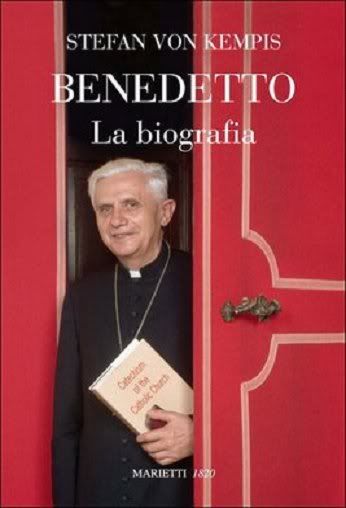
Stefan von Kempis. "Benedetto. La Biografia".
Translated by Carlo Carniato
Casa Editrice Marietti, 2008, 224 pagine, 16 euros
This biography, so far the most complete, shows an unusual portrait of Joseph Ratzinger, based on many interviews with colleagues and friends of Joseph Ratzinger, an even from personal encounters and interviews by the author with the Holy Fahter.
There is a lot of 'news' and Von Kempis's writing is gripping, rich and flowing. Even is the accent is on the 'private Ratzinger", it does not lack for ample excerpts from the Pope's theology and his Magisterium.
The book takes off from a lively reconstruction of the atmosphere that shaped the infancy and childhood of Joseph Ratzinger: Germany and above all, Bavaria, at tne end of the 'golden 20s', the simple and direct faith he imbibed in his family, the father's repulse of Nazism.
The theological controversies faced by Ratzinger from the time he was a young professor to his time as Prefect of the Congregation for the Doctrine of the Faith, are summarized here in a way that is easily understandable.
The fascinating narration on the life of Ratzinger is masterfully framed in the historical and cultural background of Central Europe.
It even includes two poems written by Ratzinger as the young chaplain of a Munich parish soon after he was ordained a priest. [See addendum below].
Von Kempis traces the portrait of a shy and reserved theologian who had the strength to oppose the theological establishment and who is now the nead of the Catholic Church.
* * * * * * * * * * * * * * * * * * * * * * * * * * * * * * * * * * * * * * * * * * * * * * * * * * * * * *
Here is the original book in German from which the above was translated. The main title: CHRIST IS THE WAY - The Biography of Benedict XVI. It originally came out in 2006, one of a bumper crop of books by and on Benedict that came out in 2006 before and after his visit to Bavaria.
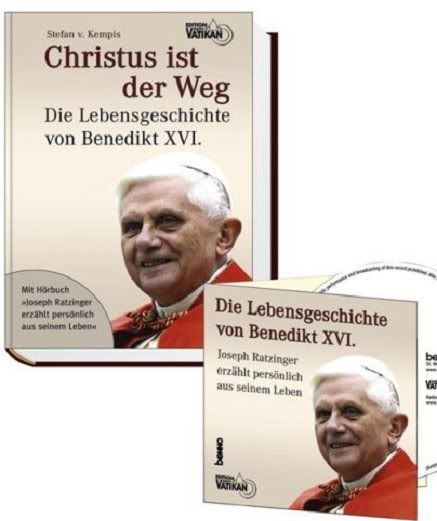 What's intriguing about the book as it is being advertised on Amazon today is that it comes with a CD that says "Joseph Ratzinger personally narrates about his life". Does anyone of our German members know what the CD actually contains?
What's intriguing about the book as it is being advertised on Amazon today is that it comes with a CD that says "Joseph Ratzinger personally narrates about his life". Does anyone of our German members know what the CD actually contains?
At the time, I read that Von Kempis is a German who works as an editor in the German service of Vatican Radio, presumably continues to work there, and explains his access to the Holy Father.
The other interesting thing is that his page on Amazon.de lists a number of books he has already written about Benedict XVI, some of them compilations of meditations and thoughts, Check it out:
www.amazon.de/s/ref=nb_ss_w?__mk_de_DE=%C5M%C5Z%D5%D1&url=search-alias%3Daps&field-keywords=STEFAN+KEMPIS&x...
The other bit I will dredge up is that a few months after the biography first came out, Maklara sent us this note on 4/10/2007:
I would love to share with you something what I have found in book from Stefan von Kempis titled Benedetto Biographie (Leipzig 2006) on page 136. (As You know young Joseph Ratzinger used to write also poems, for example in the war prison there were Greek hexametres. I was always courious what his poems might look like. And in this book are two short poems written for two his small pupils who asked him ?their chaplain and religion teacher to write something intheir remember-books.
It is also curious because the first girl was often ?set behind the classroom-door by him because she used to talk too much. Hmm, I really already should know what can we wait from that author but I must admit I was very surprised, shocked, how formally precise (rhyme, rhythm?) they are and natural at once.
Gott allein genügt:
Was das Herz auch sonst noch liebt,
Was es sehnend will umfangen,
Was es dränget zu erlangen,
Ist von ihm ein Schimmer nur,
Der uns weist auf seine Spur-
Er ist´s, der Dies alles gibt:
Gott allein genügt.
Es führet uns auf allen Wege
Auf mühsalreichen und auf frohen
Geheimnisvoll doch einen Weg nur unser Leben:
Es führt uns aufwärts zu der hohen
verborgenen Welt des ewigen Gottes hin
Und dies ist alles unseres Wanderns Sinn
The first one was put on the first page:)) then follows each time short dedication with signature. It is also interesting that it is dedicated for really small girls and in spite of it such a quality. When I was younger and now too I have been always sad when almost everything for young people did not have a high quality level. As if young=not very intelligent.
I, of course, immediately dared to offer a translation, as follows:
Here is a translation of these beautiful verses (unfortunately I can't do it in rhyme):
God alone is enough:
What the heart would otherwise love,
What it would otherwise embrace,
What it is driven to long for –
Are all but a glimmer of Him.
They are but His traces –
It is Him who gives everything:
God alone is enough.
He leads us along all ways
Through troubles and through joys
Mysteriously – for life is but a way:
He leads us upwards to the heights,
The hidden world of eternal God -
The sense behind all our wanderings.
The above exchange was posted in POPE-POURRI in April 2007.
[Modificato da TERESA BENEDETTA 27/08/2008 21:15] |
 26/08/2008 16:05 26/08/2008 16:05 |
|
| | | OFFLINE | | Post: 14.771 | Registrato il: 28/08/2005
| Utente Gold | |
|

The Holy Father has no scheduled events today, Tuesday.
The Vatican Press Office released this communique on the new eruption of anti-Catholic violence in India, where, among other things, a nun was burned alive and another one raped [ See report posted yesterday in NEWS ABOUT THE CHURCH]:
COMMUNIQUE FROM THE HOLY SEE

Regarding the tragic news of violences committed against the faithful and institutions of the Catholic Church in India, the Holy See - as it expresses its solidarity with the local churches and the religious congregations involved, reproves these actions which offend human dignity and freedom and compromise peaceful civilian coexistence.
At the same time, it calls on everyone, with a sense of responsibility, to put an end to all oppression and to reconstitute a climate of dialog and reciprocal respect.
What's happening in Ossetia:
Papal Nuncio in Georgia says
aid is still blocked

TBILISI, Georgia, AUG. 25, 2008 (Zenit.org).- If a humanitarian corridor is opened into South Ossetia, as Benedict XVI is urging, the scope of the emergency there might be revealed to be larger than expected, said the Nuncio in Georgia.
Archbishop Claudio Gugerotti affirmed to Vatican Radio on Sunday that the "real emergency at present is the need to focus public opinion on the situation in South Ossetia, where there is no way of opening the humanitarian corridor the Pope called for."
Only once this corridor is opened will the extent of the humanitarian crisis caused by the Georgia-Russia war be known, he added.
Archbishop Gugerotti did affirm that Georgians gratefully welcomed the Pope's appeals on behalf of their situation. The Holy Father mentioned Georgia in his Angelus addresses Aug. 10 and 17.
"A recording of the Angelus was broadcast in Tbilisi's main square immediately after the appeal of the patriarch of Georgia," the archbishop explained.
"And we have received calls of gratitude from simple people. Also in Gori, when Caritas volunteers arrived with aid, they were told: 'We Georgians will never forget what the Pope has done for us.'"
In this connection, the nuncio highlighted the joint humanitarian effort of Orthodox and Catholics, noting that almost all the aid is going to the Orthodox population since most Catholics reside in areas not affected by the conflict.
Russia and Georgia engaged in a two-week battle after Georgia on Aug. 7 tried to take control of the separatist region of South Ossetia. Russia responded with a broad offensive, quickly taking control of Georgian territory.
Today, tensions were further heightened by a Russian Parliament vote to recognize South Ossetia and another Georgian breakaway region, Abkhazia, as independent states.
Meanwhile, the situation in South Ossetia from a humanitarian perspective remains uncertain.
"We don't know - unfortunately what we do know is through non-official sources - how the local villages are, especially the Georgian minority," Archbishop Gugerotti said. "We know there are burned-out homes and fields, destroyed villages, etc. There might be an even more serious situation there, of which we are ignorant because we don't have access to that area."
The prelate said international influence will be needed for a corridor to be opened.
"We have refugees who would like to return and who might be prevented from doing so, because we must wait to see what type of norms are established, and if they would be permitted to return to their homes," explained the prelate.
He added that "the immediate future of these people must be considered."
* * * * * * * * * * * * * * * * * * * * * * * * * * * * * * * * * * * * * * * * * * * * * * * * * * * * * * *
OR today (issue of 8/25-26).
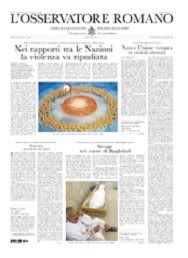 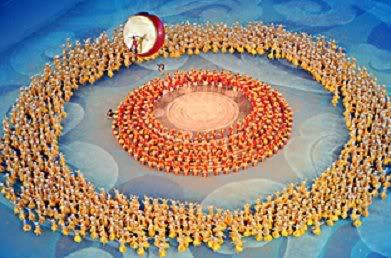
The main story was the Pope's appeal at the Sunday Angelus:
'Let violence be repudiated in the relations among nations'
Interestingly, the illustration chosen was from the closing rites of the Chinese Olympics. There are two front-page editorial commentaries -
one on 'NATO and the European Union in a crisis of identity' following Russia's recent militancy, and one remembering John Paul I
on the 30th anniversary of his election as Pope. There are three other articles on the Smiling Pope in the inside pages.
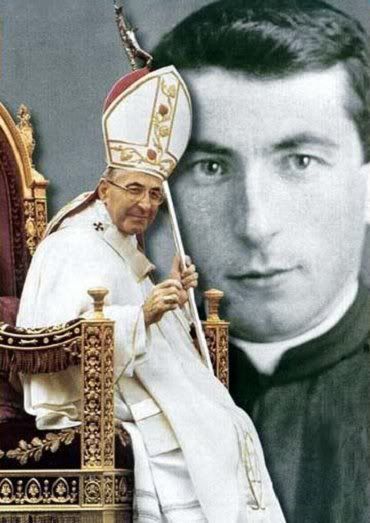 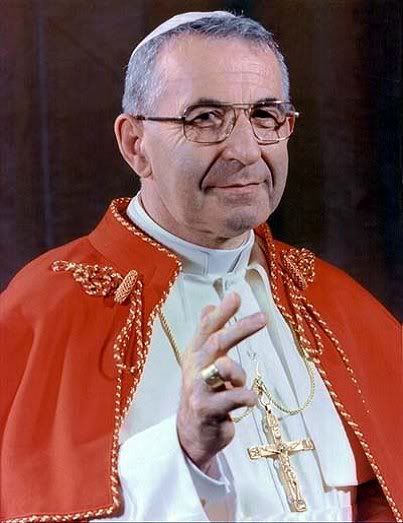 [Modificato da TERESA BENEDETTA 26/08/2008 19:43] |
 26/08/2008 17:42 26/08/2008 17:42 |
|
| | | OFFLINE | Post: 50 | Registrato il: 28/05/2007
| Utente Junior | |
|
Benedetto - Die Biografie: Die Lebensgeschichte von Benedikt XVI Theresa:
Amazon.de has one review of this book, which alongwith praise, says as follows:
Das Buch hätte durchaus 5 Sterne verdient, allerdings gibt es einen Stern Abzug, weil die beigefügte Audio-CD eine völlig falschen und irreführenden Titel trägt. Vielmehr handelt es sich bei der Audio-CD um einen Interview-Mitschnitt zwischen Stefan von Kempis und dem Kardinal Ratzinger aus dem Jahre 2002, damals war er noch Präfekt der Glaubenskongregation, in dem es um das Thema "Was ist Wahrheit" geht.
I guess it's part of an interview recorded in 2002 about one of his fav. subjects: truth.
It does sound interesting, even if it's not exactly what you would hope for, but, honestly, I don't see him telling stories of his youth/life/career in a story-like fashion on a CD, added as a complementary item to a book.
********************************************************************
I just ordered it, I hope to get it within two/three days. Since I'm on vacation this week, I'll be able to read it quite quickly. I'll let you know how I liked it. ![[SM=g27823]](https://im0.freeforumzone.it/up/0/23/5787184.gif)
********************************************************************
Thanks for the info, Heike. I was afraid the CD blurb was a misrepresentation, and so it is. For those who do not read German, the excerpt Heike cited says:
All in all, the book earns 5 stars, but it gets a one-star deduction since the accompanying audio-CD has a totally false and misleading title. It is an excerpt from an interview between Kempis and Cardinal Ratzinger in 2002, on the theme "What is truth".
And isn't that ironic? I think Kempis should have protested - to have labelled it "Cardinal Ratzinger speaks about [whatever]" or "Excerpts froma 2002 interview with Cardinal Ratzinger" would have been just as effective, because, as you so rightly point out, no one would think anyway that the Cardinal would actually read from his autobiography for commercial purposes.
I hope the biography itself will make up for that 'untruth in advertising'. Happy reading!
TERESA
[Modificato da TERESA BENEDETTA 26/08/2008 19:32] |
 26/08/2008 19:12 26/08/2008 19:12 |
|
| | | OFFLINE | | Post: 14.772 | Registrato il: 28/08/2005
| Utente Gold | |
|
REMEMBERING JOHN PAUL I:
A TRIBUTE FROM CARDINAL SCOLA
Translated from the
Italian service of
 
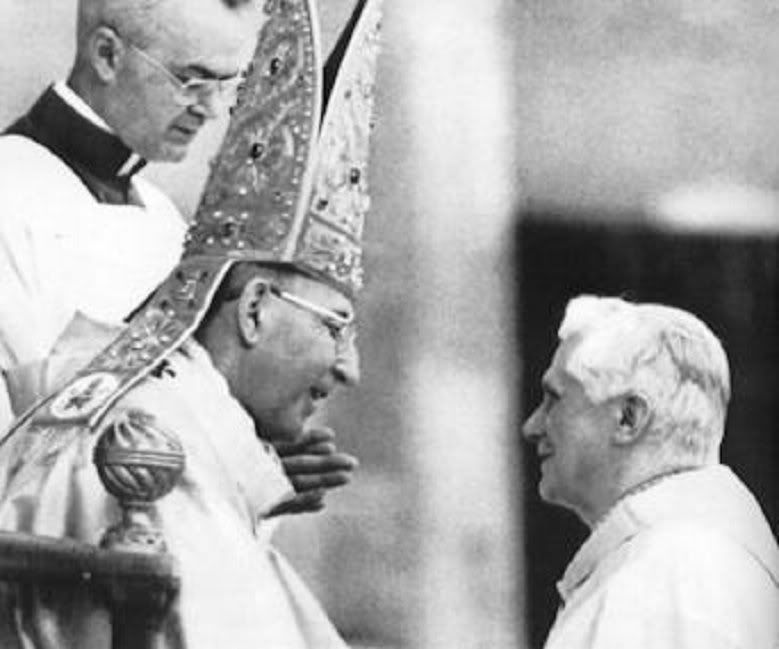 The smiling Popes: The Patriarch of Venice sees similarities between the two Pontiffs, starting with the smile.
The smiling Popes: The Patriarch of Venice sees similarities between the two Pontiffs, starting with the smile.
Thirty years ago today, Cardinal Albino Luciani, Patriarch of Venice, was elected Pope and took the name John Paul I, to honor his two immediate predecessors.
He had a very brief Pontificate - only 33 days - but it was very intense and remembered affectionately by the faithful.
In October 2006, Benedict XVI spoke his appreciation of Papa Luciani after watching a film on the 'Pope of Smiles'. He remembered him as "a master of truth and passionate catechist (who) reminded all believers - with his habitual simplicity - of the commitment and the joy of evangelization".
Here are some beautiful statements made by Papa Luciani during his brief Pontificate:
"This is what faith is: to submit to God, thus transforming one's life", he said at the General Audience on September 13, 1978, the second of only four that he held.
This submission to the will of God had always marked his life from childhood, along with his reaching out to others.
"We must love our neighbor - the Lord urged this all the time," he said. "I have always urged not just 'great' charities but small ones too."
At the Angelus on September 10, 1978, John Paul I famously described the love of God in these words:
"We are the object of God's timeless love. We know he always has his eyes open about us, even when it seems the darkest of nights to us. He is a father; even more, he is a mother. He will never want to do us wrong - he only wants what is good for all of us. When children get sick, they earn new favor for being loved by their mother. So to with us, when we are sick with evil, when we lose our way, then we have greater favor for being loved by the Lord nonetheless."
What was most striking about Papa Luciani was his sweet gentleness, his simplicity and his humility. Qualities which the faithful learned to appreciate when he was Patriarch of Venice.
His motto was "Humilitas', taken from St. Charles Borromeo. A Pope who projected the image of 'pastor of the world' in his ability to speak to everyone, to make himself understood even by his youngest listeners. An example was his Angelus message on September 17, 1978:
"Even the Pope (himself) has been a student at school, primary, secondary, upper secondary and university. As a student, all I thought about was my youth and my parish activities. No one came to say, 'You will be Pope one day!' If only someone had said so! I would have studied more, I would have prepared myself. But now I am old, and there is no more time."
The 'numbers' of his Pontificate, which lasted a month are all in single digits - 4 general audiences, 5 Angelus, 2 homilies, 9 addresses. But he cannot be reduced to only these figures.
In that time, he did what Popes do for world peace. He wrote letters to the bishops of Chile and Argentina, two nations who were on the brink of war against each other. A commitment that his successor, John Paul II, was able to bring to completion.
And he followed closely the negotiations for Middle East peace that were taking place that month in Camp David between Israel and the Palestinians, encouraging the participants to reinforce the way of dialog.
Among his official acts was naming the then Archbishop of Munich-Freising, Cardinal Joseph Ratzinger, to represent him at the third Marian Congress in Ecuador.
In his last Angelus message on August 24, Papa Luciani, in effect, left his final message for the faithful - an invitation not to allow themselves to be conquered by evil, entrusting themselves with hope to the love of Christ:
"People sometimes say, 'We live in a society that has broken down, that has become very dishonest.' That is not the case. There is so much good left, so many honest people. Rather, we must ask, 'What can we do to improve society?' I would say, that each of us should simply seek to be good and to infect others with this goodness which comes with the obedience and love taught by Christ."
This afternoon, the current Patriarch of Venice, will preside at a concelebrated Mass with other bishops of the Triveneto area in memory of John Paul I in his native town of Canale d'Agordo in the province of Belluno, northeastern Italy.
Alessandro Gisotti interviewed Cardinal Scola about his predecessor:
CARDINAL SCOLA: John Paul I was truly a great surprise from the Holy Spirit, because he allowed, through his brief but intense teaching, but above all through his person, the catholic universal expansion of the Papacy. He marked the transition from a customarily Italian Pope to a Pope who can come from any place and any continent. He paved the way for the extraordinary emergence of John Paul II, and even of Benedict XVI, who has so many traits in common with John Paul I.
How can we best remember Papa Luciani today, beyond his remarkable sweetness of spirit and his proverbial smile that captivated the faithful so much?
First, it must be said that Papa Luciani's smile cannot be taken for granted. I think it is the product of two virtues which he practiced since infancy and which he spoke about often - humility and obedience, which always go together.
So it was not simply a facile smile. Nor was it a do-gooder's smile. For Papa Luciani, conjoining humility and obedience was the result of a freedom that is always vigilant and ready to say Yes in every act or circumstance, favorable or unfavorable, that Providence demands.
Your description also fits Papa Ratzinger quite well...
Exactly! In fact, I believe Benedict XVI had a most profound and sensitive admiration for Papa Luciani, who, we recall, as Patriarch of Venice, had gone to see him in Bressanone the first summer he visited there as cardinal of Munich. At that meeting, Papa Ratzinger grasped the extraordinary culture and evangelizing depth of the man who would become the next Pope.
One simply has to read Papa Luciani's book Illustrissimi to realize his spiritual refinement and how amply evolved he was, not to mention what literary sensibility he was gifted with.
Again, his communicative power was the result of the patient effort of simply feeling oneself to be a servant of the people of God, and to that end, he always sought to adapt his way of communicating. It would have been beautiful to have learned more from him.
What did Patriarch Luciani give to Venice, to his diocese? What remains today from his years as Patriarch?
Patriarch Luciani led the diocese during a time of great turmoil for the whole nation and also the whole Catholic world. It was the immediate post-Conciliar era, and there were quite a few tensions in the diocese at the time - which the Patriarch faced , with a combination of loving attention and the sense of authority that was characteristic of him.
He had a strong sense that the task of the pastor is to unite the people of God. And so, he was very demanding on himself in terms of obedience, just as he demanded obedience from his priests, even though this was not without its problems.
His legacy was his testimony of the beauty of giving one's life totally to Christ, which one sees consistently in reviewing all his teachings. I think most of all of his homilies at St. Mark's [Cathedral of Venice], but also of his meetings with priests. And then, his passion for evangelization through catechesis which he had since he was a child - and in this, he revived the great tradition of another Patriarch who became Pope, Pius X.
The following editorial in today's OR further shows the ways in which John Paul I and Benedict XVI were alike.
Thirty years ago -
the brief trajectory
of John Paul I
Editorial
by Giovanni Maria Vian
Translated from
the 8/25-26/2008 issue of

The Conclave that began on August 25, 1978, was very brief, but in the joyous surprise over the new Pope, no one could have imagined the brevity of the pontificate that would begin the following day, in the fading light of a warm Roman sunset.
The chosen one was Albino Luciani, the Patriarch of Venice, first to introduce a double name to the papal series, with the intention of taking up both the legacies of John XXIII and of Paul VI.
It was an attempt to contradict the false juxtaposition between his two immediate predecessors - first made during the years of Vatican-II even if historically unfounded as well as exploitative - who had, respectively, made him bishop then cardinal.
Little known until the 'sede vacante' (interregnum between the death of Paul VI and the election of the new Pope) that summer, the new Pope was able to conquer public attention instantly by his simple and unassuming manner, his soft way of speaking which was capable of touching the heart of his listeners. [If Cardinal Ratzinger's election as Pope had not been preceded by more than two decades of misrepresentation in the media, he might have been welcomed by everyone in exactly the same way in April 2005!]
Above all, during the four general audiences he gave that September, each one with an inreasingly larger audience - calling to mind the historic meetings that one of his predecessors in both the Patriarchate of Venice and Peter's Chair, Pius X, who, in both situations, gave memorable catecheses in the manner of a parish priest - John Paul I started to explain the basic truths of the Christian faith.
He did so with scrupulously prepared texts that he delivered with surprising spontaneity - he spoke of faith of hope and of charity, after having devoted his first audience, significantly, to humility, certainly in reference to his episcopal motto 'Humilitas' which he had taken from St. Charles Borromeo.
Those discourses that flowed clearly and enchanted his listeners reflected a traditional and solid formation, united with ancient wisdom and a rare ability to communicate the simple nucleus of the Christian faith.
At his first general audience on September 6, he recalled Paul VI and his Wednesday catecheses, telling the faithful: "I will try to follow him, in the hope that I, too, may in some way help people to become 'more good'."
And people immediately saw into the heart of the new Successor of Peter, perhaps impressed as well by his continuous evocation of the mother figure, which was constant in all of his four audience catecheses.
Then suddenly, on the night of September 28, came the end of the new Pope's trajectory, so unexpected as to raise the imagined and implausible theory of an unnatural death in fictional and far from disinterested 'reconstructions'.
But in those days, what was recalled was the last similarly brief and promising pontificate - that of Leo XI, a disciple of St. Phillip Neri who became Pope for less than a month in 1601 - Ostensum magis quam datus, shown to us rather than given - according to the tombstone on his sepulcher in St. Peter's Basilica.
It was an expression that John Paul II later used to refer to his predecessor on the first anniversary of his death. Yes, even John Paul I was 'shown but not given' to the Church and to the world. It's a definition that summarizes his Pontificate in the historical view, but also situates him within God's mysterious and providential plan.
* * * * * * * * * * * * * * * * * * * * * * * * * * * * * * * * * * * * * * * * * * * * * * * * * * * * * * *
The two other articles on John Paul I in the 8/25-26 issue of OR are a historical summary of those 33 brief days as Pope, and a wonderful tribute and memoir by John Paul II delivered on the first anniversary of John Paul I's death. I will post translations as soon as I can.
[Modificato da TERESA BENEDETTA 27/08/2008 01:43] |
 26/08/2008 21:00 26/08/2008 21:00 |
|
| | | OFFLINE | Post: 1.516 | Registrato il: 27/11/2005
| Utente Veteran | |
|
Going back to the USA trip.......
I watched the entire coverage by EWTN from the USA - mostly Raymond Arroyo with Father Neuhaus - and I gave up trying to count the number of times Father Neuhaus referred to "John Paul the Great". It became a bit ridiculous and annoying, in my opinion.
Here we were, watching our wonderful Papa Benedict XVI winning hearts everywhere and delivering a lasting legacy of love and hope - and that was all Father Neuhaus could do. I must say, I had a laugh when he fell off his chair at the Yonkers meeting with young people. I bear him no ill will....and he was unhurt! |
 26/08/2008 23:25 26/08/2008 23:25 |
|
| | | OFFLINE | | Post: 14.774 | Registrato il: 28/08/2005
| Utente Gold | |
|
 A fixed point on
A fixed point on
the international scene today:
Benedict XVI asks nations
to repudiate violence
Editorial
by Carlo Di Cicco
Translated from
the 8/27/08 issue of

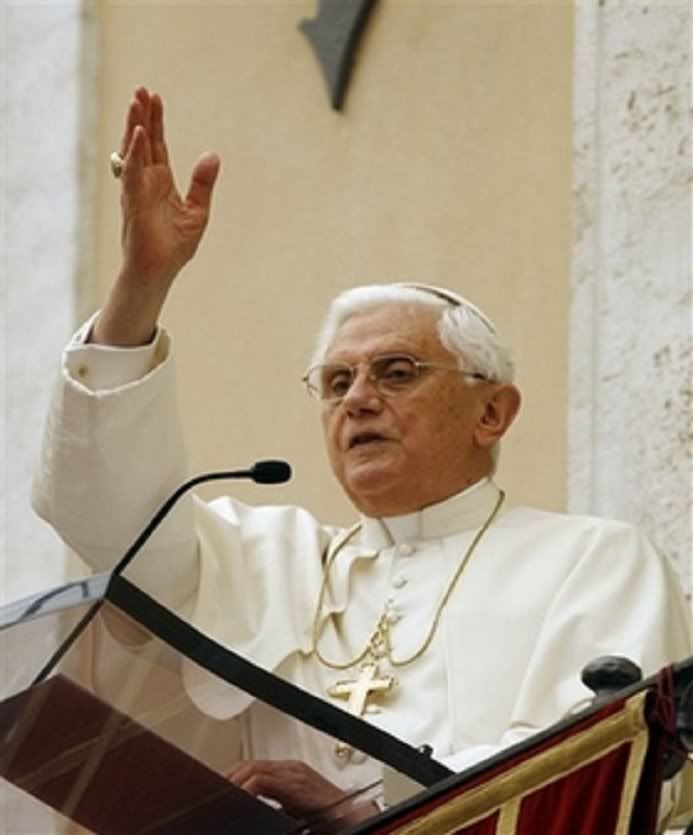
From India, the Caucasus and Africa come alarming signals adding to other situations of suffering and conflicts long under way in the Near and Middle East.
Benedict XVI has expressed his concern promptly, speaking Sunday of the 'risk of a progressive deterioration of that climate of trust and collaboration among nations which should characterize their relations."
Far from having any idyllic notion of the international situation, the Pope sees "all the efforts of mankind to form that common consciousness of being the 'family of nations' indicated by John Paul II as the ideal for the United Nations."
At the same time, he urges a decisive change in political and diplomatic initiatives to "avoid a return to nationalistic counterpositions which have produced such tragic consequences in other historical periods."
Today, more than ever, he says, "the temptation to face new situations with old methods" - which make violence the first recourse in trying to resolve controversies among peoples - should be resisted.
The principal paths to take "with tenacity and creativity', he says, "should be the moral force of the law; equitable and transparent negotiations to reduce controversies on the basis of territorial integrity and self-determination for peoples; faithfulness to one's given word; and a search for the common good."
The creativity proposed by the Pontiff is not improvisation but the audacity to respond in new ways to new challenges.
In addition to urging initiatives for good government, Benedict XVI also invites believers to pray so that those in the international community who have greater responsibility "may work generously to revive the higher causes of peace and justice".
To propose prayer at a point when political forces appear to be stymied is not evasion. In the Pope's perspective, prayer does not take the place of responsibility. It springs from the tight link between the human horizon and the transcendent, a link that allows man to look at events with less pessimism.
In the same Angelus message, the Pope clarifies the unity underlying the distinction between historical commitment and religious faith that is typical of the Christian vision.
Indeed, he presents the mission of the Church as "the realization of God's grand plan to reunite in Christ all of mankind into one human family."
For this reason, the ministry of Peter's Successor is to be vigilant that the Church "never identifies itself with one nation, one culture, but is the Church for all peoples, which can make present among men, marked by countless divisions and differences, the peace of God and the renewing power of love."
It is a reading of the Church and Petrine service that helps to understand the freedom of spirit within the Church.
Faith and reason, the double principle that guides the Magisterium of this Pope, do not apply only to speculative thought but to the human story of every day. The Pope asks of Christians an additional commitment: to bear witness by their way of life in order that the Church may be seen as truly the home for all, and not in competition with anyone.
This concern to give testimony of a life inspired by the Gospel as the best means to give credibility to the Church and to an active role for Christians in the world is also evoked in the message of the Pope sent to the annual Meeting in Rimini by Cardinal Secretary of State Bertone. [ See full translation of this beautiful and powerful text in HOMILIES, DISCOURSES, MESSAGES]
It is not by chance that a text which is otherwise concerned with the educational challenge reiterates a teaching that is very dear to Benedict XVI in his reformatory activities: the credibility of God in a world which must labor to encounter him has always been - but especially in today's world - dependent on the credibility of Christians first of all.
The message proposes the model of the Apostle Paul for this - and after him, all the saints, including the countless "men and women who have often lived their faith in God in discreet and ordinary ways", contributing to the positive course of history without benefit of publicity.
* * * * * * * * * * * * * * * * * * * * * * * * * * * * * * * * * * * * * * * * * * * * * * * * * * * * * * *
About Fr. Neuhaus and his comments during the coverage of the Pope's visit to the US: I didn't do very well at the time hiding my disillusion, almost, that he couldn't see beyond his tunnel vision to say anything good about the Mass at Nationals Stadium, that he had lost perspective in seeming to give more importance to the kind of music that the diocese of Washington chose to use for the Mass, rather than to the entire impact of the Mass itself - which was enormous, as even Cardinal Sean wrote on his blog, especially for those who were there: it had a beauty that was not dependent in any way on the fact that the music was not 'high liturgy', but which was nonetheless as genuine and as devout and as moving in its own way as the later Masses in St. Patrick and at Yankee Stadium. (I mean, what could possibly spoil a Mass celebrated by Benedict XVI? Not even those chasubles in Mariazell could! He just elevates and sublimates everything that is ultimately non-essential.)
And then, of course, as Janice and MaryJos have commented, there was Fr. Neuhaus's unfortunate falling back into rhapsodizing about John Paul II - which no one begrudges him - except that it became a reflex for him during the coverage, almost as though everytime he said something enthusiastic about Benedict XVI, he had to balance it off with a rhapsodic riff on John Paul. Who knows why he thought it necessary to do so. It's not as if John Paul were keeping count in the Great Beyond, much less be concerned in any way if Benedict XVI received his share of praise!...
The lesson is that even eminent persons like Fr. Neuhaus show feet of clay, sooner or later, especially if they have to carry on speaking for hours on end to fill the air during a coverage. (I do not know why EWTN limited itself to having Fr. Neuhaus and Raymond Arroyo carry 90% of the commentary for that coverage. They got to be tiresome and tedious at times - so when someone like Carl Anderson came along during that coverage, it was like Coca-Cola - the respite that refreshes!)
[Modificato da TERESA BENEDETTA 27/08/2008 13:46] |
 27/08/2008 07:11 27/08/2008 07:11 |
|
| | | OFFLINE | | Post: 14.776 | Registrato il: 28/08/2005
| Utente Gold | |
|
 Joseph Ratzinger remembers
Joseph Ratzinger remembers
Paul VI, John Paul I and the conclaves of 1978
by Gianni Cardinale

August 2003
In an issue to mark the 25th anniversary of the election of John Paul I, the magazine 30 GIORNI ran this most interesting interview with then Cardinal Joseph Ratzinger, which, to my knowledge, has not been previously posted in full on this Forum, although parts of it may have been posted at one time or other.
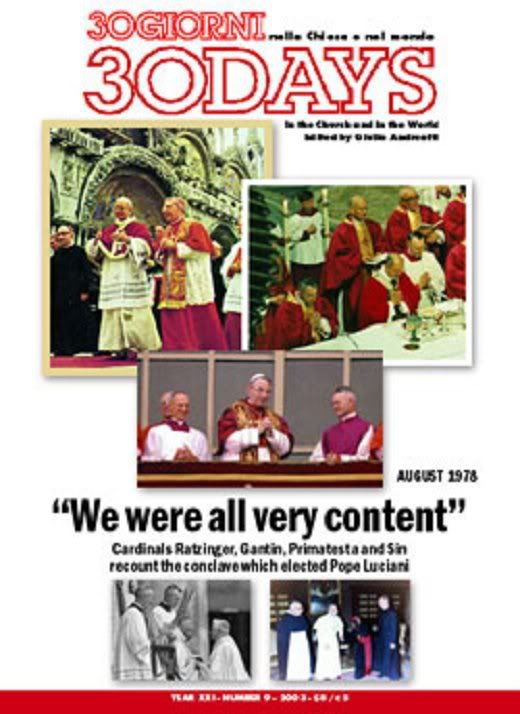
The summer of 1978 was no ordinary summer for the Catholic Church. In the span of a few weeks the cardinals found themselves together twice in conclave to elect Peter’s successor.
On August 6, in fact, after fifteen years of pontificate, Paul VI, who would have been 81 the following September 26, died.
On August 26, after a very short conclave - two days and four ballotings – Albino Luciani, the Patriarch of Venice, was elected Pope, taking the name of John Paul I. He would have been 66 on October 17. But he didn’t celebrate that birthday.
His pontificate lasted barely thirty-three days. At dawn on September 28, the new Pontiff was found dead in his bedroom.
The Sacred College therefore came together again for the conclave that on October 16 – after eight ballotings in three days – saw the election of the 58-year-old Archbishop of Krakow, Karol Wojtyla, who, under the name John Paul II, became the first Polish pope in history, the first non-Italian for 456 years.
To recall twenty-five years later the dramatic events of that summer, 30 GIORNI asked for an account from Cardinal Joseph Ratzinger, 76, undoubtedly the best known of the 21 cardinals of the current Sacred College who took part in the two conclaves of 1978.
We also spoke with the Bavarian cardinal about his conversations and meetings with Papa Montini and Papa Luciani in 1977 and 1978.
Cardinal Joseph Ratzinger doesn’t need much introduction. A famous theologian from the period of the Vatican Council II, appointed Archbishop of Munich and Freising and made cardinal in 1977 by Paul VI, he is currently the only European cardinal created by Pope Montini who would sit in an eventual conclave.
Called to Rome by Pope Wojtyla in 1981, he has since then headed the Congregation for the Doctrine of the Faith, the Pontifical Biblical Commission and the International Theological Commission. Currently he is the longest-serving of the department heads of the Roman Curia. Elected Vice-dean of the Sacred College in November 1998, he was elected Dean at the end of last year.
Your Eminence, on 24 March 1977, Paul VI named you Archbishop of Munich, and not long after, he made you a cardinal…
JOSEPH RATZINGER: Two or three days after my episcopal consecration on May 28, I was informed of my nomination as cardinal, which therefore almost coincided with the sacramental ordination.
It was a great surprise to me. I still don’t know how to explain it myself. I know however that Paul VI was aware of my work as theologian. Some years earlier, perhaps in 1975, he had invited me to preach the spiritual exercises in the Vatican. But I didn’t feel sure enough of my Italian nor of my French to prepare and risk such a venture, and so I said no. But it was evidence that the Pope knew about me.
Maybe Monsignor Karl Rauber, now Nuncio in Belgium, played some part in the story. He was then a close collaborator of the Cardinal Giovanni Benelli, the deputy Secretary of State (Sostituto). In any case, it’s a fact, I was told that in picking out one of the three possibilities proposed for the Munich appointment, the Pope personally chose my poor self.
The consistory of June 27, 1977, was small, with only five new cardinals…
RATZINGER: Yes, we were a small group, interesting and congenial. There was Bernardin Gantin, the only one still alive apart from myself [Cardinal Gantin died recently]. And then Mario Luigi Ciappi, the theologian of the Pontifical House, Benelli of course, and Frantisek Tomasek, who had been chosen in pectore the year before and who received the honor along with us.
They say it was Benelli, who had been appointed Archbishop of Florence on June 3, who “chose” the names for that “mini-consistory”…RATZINGER: It's possible. I never thought then or not to look into these things. I respect Providence, and I am not interested in what its instruments may be.
What do you remember of that ceremony?
RATZINGER: At the consigning of the biretta in the Paul VI Hall, I had a great advantage over the other new cardinals. None of the other four had a large 'family' with him. Benelli had worked for a long time in the Curia and was not very well known in Florence yet, so there weren’t many faithful from Tuscany. Tomasek – there was still the Iron Curtain – couldn’t have a delegation from home. Ciappi was a theologian who had always worked, so to speak, in his own island. Gantin is from Benin, and it’s not easy to get from Africa to Rome.
Whereas the people who had come from Munich and Bavaria for the occasion almost filled the hall...
You stood out in a way...
RATZINGER: In a certain sense, yes. Because the applause for me was greater than for the others. You could tell Munich was 'present'. And the Pope was visibly pleased to see his choice in some way confirmed.
Were you able to have a personal conversation with the Pope on that occasion?
RATZINGER: After the ceremony of giving us the ring, I was told that Paul VI wanted to speak to me in private. For so many years, I had been a simple professor, very far from the upper reaches of the hierarchy, and I didn’t know how to behave, I felt a bit awkward in that context. I had not dared speak to the Pope because I still felt too minor, but then, he was very kind and encouraged me to speak up. It was a conversation without a specific purpose - I think he just wanted to know me first-hand - perhaps because Benelli had spoken to him about me.
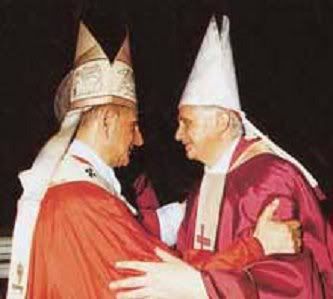 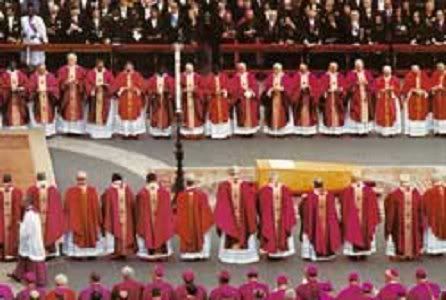 What do you remember of the last year of Papa Montini's pontificate?
What do you remember of the last year of Papa Montini's pontificate?
RATZINGER: Earlier that year (1978), I had come to Rome, along with the other bishops of Bavaria, for our ad limina visit. And on that occasion, we had a beautiful meeting with the Pope. He began to speak in German, which he spoke fairly well, but he decided to continue in Italian because it was easier for him.
He spoke from the heart - about his life, his first visit to Germany. He recalled that the first time he came to Munich as a young priest, he was somewhat lost, but he found many people who helped him.
It was a personal conversation, without any speeches - you could see he was opening his heart and he simply wanted to share some moments with some of his brothers in the episcopate. It was a very pleasant encounter.
Did you come to Rome at other times when Paul VI was Pope?
RATZINGER: Yes, for his eightieth birthday [26 September 1977]. Also one month later. On October 16, he celebrated High Mass in St. Peter’s. I was impressed on that occasion when he quoted the verse in the Divine Comedy where Dante speaks about «that Rome where Christ is Roman» [Purgatory, XXXII, 102, ed.].
Paul VI was considered somewhat as an intellectual who had difficulty warming up to people. At that moment he showed an unexpected warmth for Rome itself. I didn’t know or didn’t remember those words from Dante - I was very impressed. As if, with those words, Paul VI wanted to express his love for the Rome that had become the city of the Lord, the center of His Church.
How did you learn of his death?
RATZINGER: I was on holiday in Austria. On the morning of August 6, I was informed that the Holy Father had suddenly taken ill. I called my Vicar General in Munich to immediately ask the whole diocese to pray for the Pope. I went on a little excursion, and when I returned, I had another phone call telling me the Pope was in worse condition, and shortly afterwards, that he had died.
So I decided to return to Munich the following morning. After writing a pastoral letter to the diocese about the Pope's death, I left for Rome.
To attend the Pope’s funeral...
RATZINGER: What struck me was the absolute simplicity of the coffin, and the Gospel placed on top of it. The lack of ostentation - which the Pope had decided - almost shocked me.
I was also impressed by the funeral Mass celebrated by Cardinal Carlo Confalonieri, who being over eighty, would not take part in the conclave: he gave a very fine sermon. As did Cardinal Pericle Felici during another Mass, recalling how, during the funeral, the pages of the Gospel on the Pope’s coffin had been turned by the wind.
I then returned to Munich to celebrate a Mass of suffrage - the cathedral was full to overflowing. Then I came back to Rome for the conclave.
You were a 'rookie' cardinal…
RATZINGER: I was among the youngest but, because I was a diocesan bishop, I belonged to the order of cardinal-priests and hence, in the protocol, I came before many Curia cardinals who belong to the order of deacons. So I was not among the last-placed. I remember that at lunch, the same order of precedence was followed, and I found myself between Cardinals Silvio Oddi and Felici, two of the most Italian of cardinals.
What was your role in that conclave?
RATZINGER: Some of us German-speaking cardinals had some meetings beforehand. Joseph Schröffer, who was Prefect of Catholic Education, Joseph Höffner of Cologne, the great Franz König of Vienna – who is alive still, Alfred Bengsch of Berlin, were among those who took part in those meetings. Also Paulo Evaristo Arns and Aloísio Lorscheider, Brazilians of German origin.
It was a small group. We absolutely didn’t want to decide anything, but only to talk a bit. I let myself be guided by Providence, listening to the names discussed, and finally seeing how a consensus was formed about the Patriarch of Venice.
Did you know him?
RATZINGER: Yes, I knew him personally. During the summer vacation of 1977, in August, I was staying in the diocesan seminary of Bressanone, and Albino Luciani came to visit me. The Alto Adige is part of the ecclesiastical region of the Triveneto and he, a man of exquisite courtesy, felt that as Patriarch of Venice, he was almost obliged to go visit a new colleague. I felt unworthy of such a visit.
On that occasion I was struck by his great simplicity, and also by his great culture. He told me he knew the area well, and that as a child he had come with his mother on pilgrimage to the sanctuary of Pietralba, a monastery of Italian Servites located at an altitude of a thousand meters - it is much visited by the faithful of the Veneto. Luciani had many beautiful memories of the region, and so he was pleased to be back in Bressanone.
You’d never met him before?
RATZINGER: No. As I said earlier, I had lived in the academic world, very far from the hierarchy, and I didn’t know any Church leaders in person.
Did you meet him again after that?
RATZINGER: No, not until the conclave of 1978.
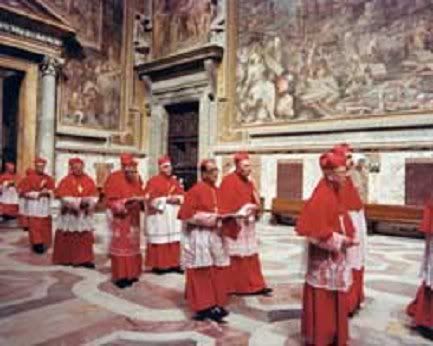
30 Giorni's caption for this picture says it shows Cardinals Luciani
and Ratzinger among the cardinals en route to the Conclave. I can't
tell where they are in the picture.
Did you exchange words with him on that occasion?
RATZINGER: Some, because we already knew each other, but not much. There was much to do...
What were your impressions after his election?
RATZINGER: I was very happy about it. To have as pastor of the universal Church a man of such goodness and with his luminous faith was a guarantee that things were going well.
He himself was surprised and obviously felt the weight of the great responsibility. You could see he suffered a bit... He hadn’t expected to be elected. He wasn’t a man out to make a career. He thought of the positions he had occupied as rendering service, perhaps even as a suffering.
When was the last time you spoke to him?
RATZINGER: The day of his investiture, on September 3. The archdiocese of Munich and Freising is twinned with the dioceses of Ecuador, and a national Marian Congress had been organized for that month of September in Guayaquil. The local episcopate had asked for me to be appointed papal delegate to the Congress. John Paul I had read the request and decided in favor of it; so, during the traditional leave-taking of cardinals, we spoke about my trip, and he invoked blessings on me and on the whole Church of Ecuador.
Did you go to Ecuador?
RATZINGER: Yes, and it was precisely while I was there that the news of the Pope’s death reached me. In a somewhat curious way.
I was staying in the bishop’s residence in Quito. I hadn’t closed my bedroom door because in a bishop’s residence I feel as though I am in the bosom of Abraham! It was the dead of night when into my room came a swathe of light followed by a man dressed in the Carmelite habit. I was a bit stunned by the light, and the man dressed almost lugubriously looked to be a bearer of bad news. I wasn’t sure if it was a dream or reality.
Finally I realized he was one of the auxiliary bishops of Quito (Alberto Lunar Tobar, now archbishop emeritus of Cuenca, ed.), who came to tell me that the Pope had died. And that is how I learned of the sad and unexpected event.
Despite the news I managed to get back to sleep with the grace of God. In the morning, I celebrated Mass with a German missionary, who, in the prayer of the faithful, prayed «for our late Pope John Paul I». My lay secretary, who was at the Mass, came to me afterwards in dismay that the missionary had made a mistake, that he should have prayed for Paul VI and not for John Paul I. He still hadn’t heard of the death of Albino Luciani.
You saw the Pope at the conclave. When you took your leave of him, did he look like a man who might die within the space of a month?
RATZINGER: He seemed fine to me. Certainly he didn’t give the impression of great health. But many people look frail and then live to be a hundred. I'm no doctor, but he looked in good health to me - even if, like me, he didn't look very robust. But it is such people who usually have a greater life expectancy.
Did you have any doubts when the gossip began about the Pope dying an unnatural death?
RATZINGER: No.
The Bishop of Belluno-Feltre, the Salesian Vincenzo Savio, reported that last June 17, he received a 'nulla osta' from the Congregation for the Cause of Sainthood to proceed with the process towards beatification of the Servant of God Albino Luciani. What do you think of the matter?
RATZINGER: Personally I’m altogether convinced he was a saint. Because of his great goodness, simplicity, humility. And for his great courage. He had the courage to say things with great clarity, even going against current opinions.
And then there was his great culture in the faith. This was no simple parish priest who had become Patriarch by chance. He was a man of great theological culture and of great pastoral sense and experience. His catechetical writings are precious. And his book Illustrissimi, which I read immediately after his election, is beautiful!
Yes, I am very convinced that he is a saint.
Even though you met him only on three occasions?
RATZINGER: Yes, it was enough for his luminous personality to irradiate me with that belief.
When you came together again for the second conclave in 1978, what was the dominant feeling in the College of Cardinals?
RATZINGER: After that sudden death, we were all quite depressed. It had been a bad blow. Of course, we had been sad at the death of Paul VI. But he had lived a full life which had a natural epilog. He himself was expecting death and spoke about it.
After such a great pontificate, we then had a new beginning, with a Pope of a different type, but in full continuity. That Providence had said No ultimately about the man we chose was really a hard blow. But the election of Luciani was not a mistake. And those thirty-three days as Pope had a function for the history of the Church.
Which is?
RATZINGER: It was not only his testimony of goodness and of joyful faith. But his sudden death also opened the doors to an unexpected choice - that of a non-Italian Pope.
Was this possibility considered during the first conclave of 1978?
RATZINGER: There was some talk. but it was not a real hypothesis - if only because we had the fine figure of Albino Luciani as the consensus choice. But after he died, it was thought that we needed something absolutely new.
[Modificato da TERESA BENEDETTA 27/08/2008 07:14] |
 27/08/2008 12:31 27/08/2008 12:31 |
|
| | | OFFLINE | | Post: 82 | Registrato il: 16/07/2007
| Utente Junior | |
|
Maryjos,
Fr. Neuhaus' attitude really showed during the Pope's visit to America. He covered the visit with Raymond Arroyo on EWTN. On the day of the Pope's arrival he was so sour I switched to FOX News. The reporter at Andrews AFB couldn't stop talking about how glad she was to be there and the reporters in the Washington and NY offices said the rooms were completely silent when the Pope disembarcked from the plane. They were just awed by the experience. Then I switched back to EWTN and there was Fr. Neuhaus with a sour expression on his face, talking about "John Paul the Great" and hardly referring to Benedict at all.
I think Fr. Neuhaus sees Pope Benedict as a placeholder for "John Paul the Great" and of no importance on his own. I think he's also puzzled that people actually have responded to Pope Benedict in a very positive way and he's more than a little irritated by the changes Pope Benedict has made (i.e., de-restricting the Latin Mass, less emphasis on inculturation) that are a departure from what John Paul did. |
 27/08/2008 13:36 27/08/2008 13:36 |
|
| | | OFFLINE | | Post: 14.778 | Registrato il: 28/08/2005
| Utente Gold | |
|
  www.radiovaticana.org/it1/videonews_ita.asp
For the latest videonews on the Holy Father
www.radiovaticana.org/it1/videonews_ita.asp
For the latest videonews on the Holy Father
OR today.
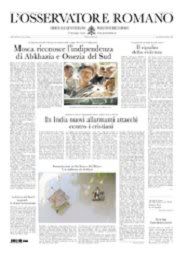 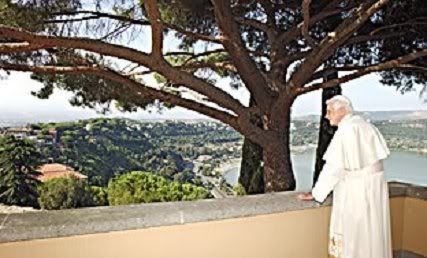 The main story: Moscow recognizes the independence of Abkhazia and South Ossetia, Georgia's two secessionist states.
The main story: Moscow recognizes the independence of Abkhazia and South Ossetia, Georgia's two secessionist states.
Also: New alarming attacks in India against Christians.
A Page 1 editorial comments on the Holy Father's Angelus message Sunday on 'The repudiation of violence' -
a piece I translated and posted yesterday afternoon (a few posts above) as soon as the 8/27/08 OR came online.
The photo of the Holy Father comes with an interview with the director of the Pontifical Villas of Castel Gandolfo
who reminisces about the 5 Popes he has served, starting with Pius XII. I have posted the translation in POPE-POURRI.
GENERAL AUDIENCE TODAY
A full translation of the Holy Father's catechesis and message today has been posted in AUDIENCE & ANGELUS TEXTS.
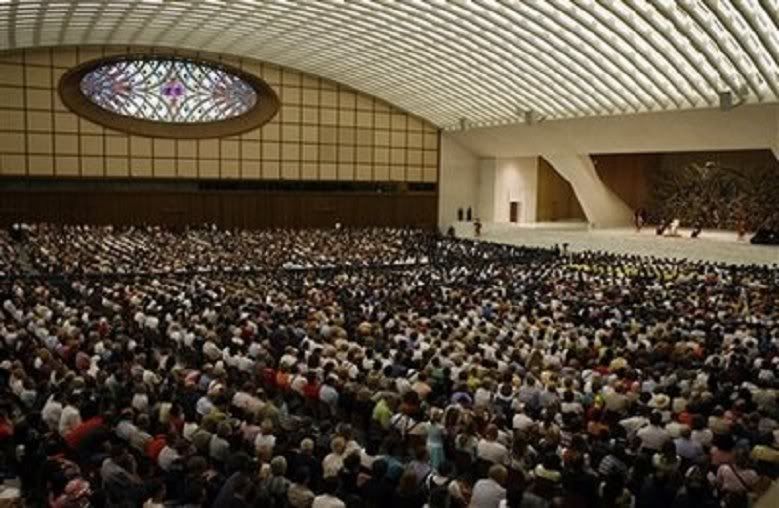
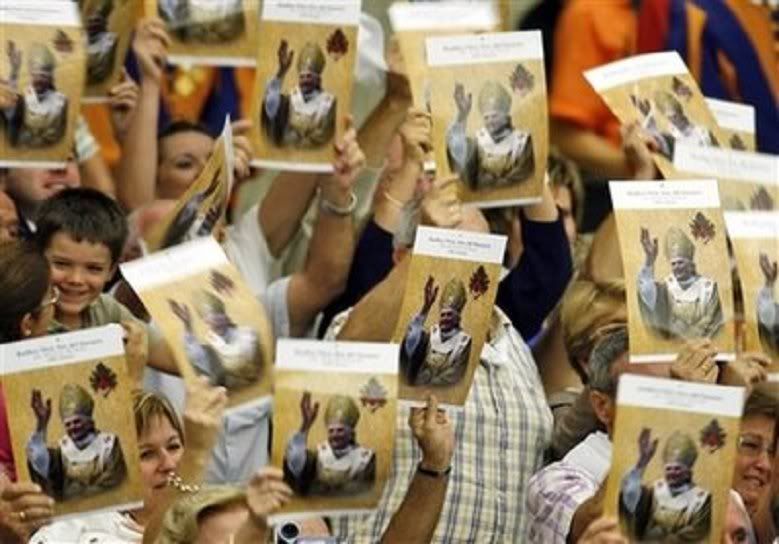
The Holy Father continues to be in residence at Castel Gandolfo, but today he flew to the Vatican to hold the General Audience at the Aula Paolo VI.
He resumed the catechetical cycle on St. Paul which he started the week before he left for Australia; and then made a statement about about the new wave of anti-Christian violence in India.
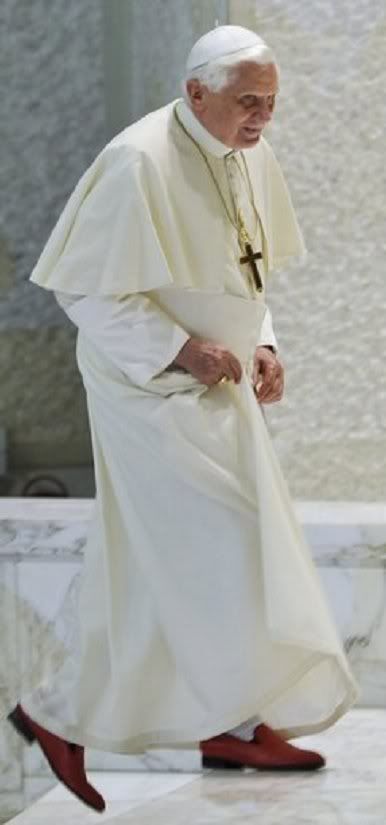 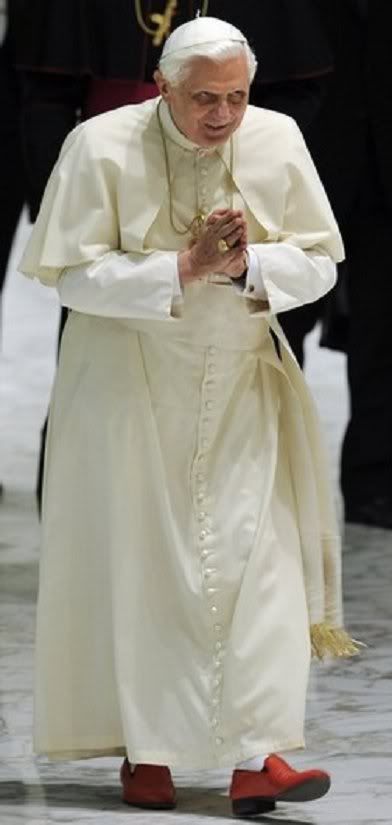
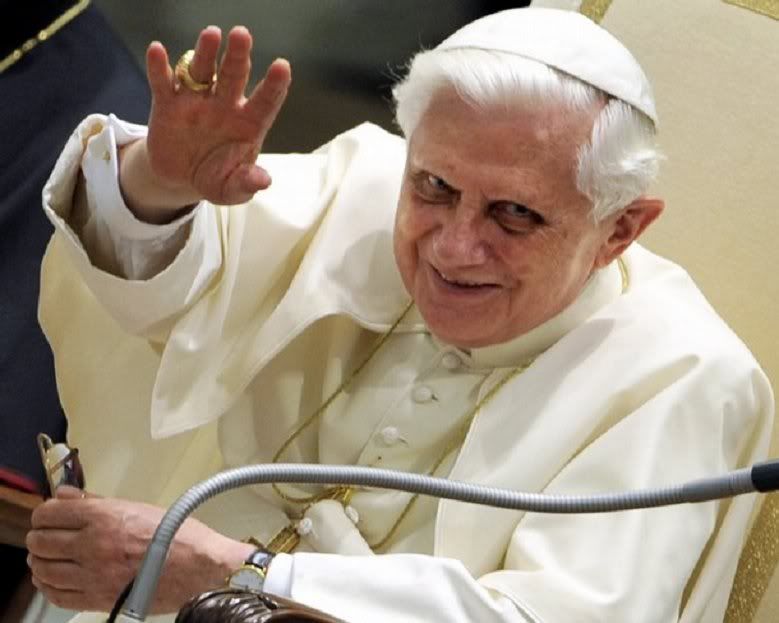
Here is how the Holy Father synthesized the catechesis in English:
Today’s catechesis presents the life of Saint Paul, the great missionary whom the Church honours in a special way this year.
Born a Jew in Tarsus, he received the Hebrew name "Saul" and was trained as a "tent maker" (cf. Acts 18:3). Around the age of twelve he departed for Jerusalem to begin instruction in the strict Pharisaic tradition which instilled in him a great zeal for the Mosaic Law.
On the basis of this training Paul viewed the Christian movement as a threat to orthodox Judaism. He thus fiercely "persecuted the Church of God" (1 Cor 19:6; Gal 1:13; Phil 3:6) until a dramatic encounter on the road to Damascus radically changed his life.
He subsequently undertook three missionary journeys, preaching Christ in Anatolia, Syria, Cilicia, Macedonia, Achaia, and throughout the Mediterranean. After his arrest and imprisonment in Jerusalem, Paul exercised his right as a Roman citizen to appeal his case to the Emperor.
Though Luke makes no reference to Nero’s decision, he tells us that Paul spent two years under house arrest in Rome (cf. Acts 28:30), after which — according to tradition — he suffered a martyr’s death.
Paul spared no energy and endured many trials in his "anxiety for all the churches" (2 Cor 11:28). Indeed, he wrote: "I do everything for the sake of the Gospel" (1 Cor 9:23). May we strive to emulate him by doing the same.
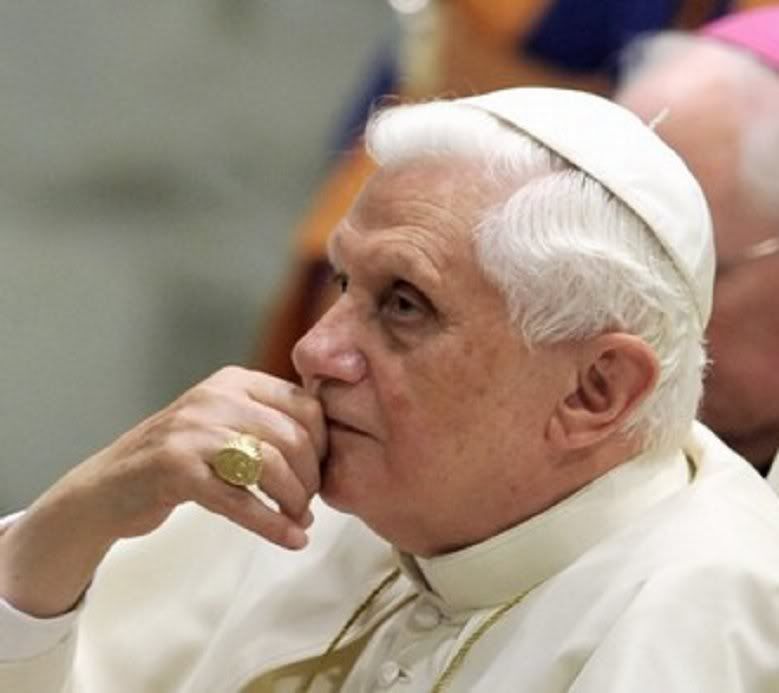
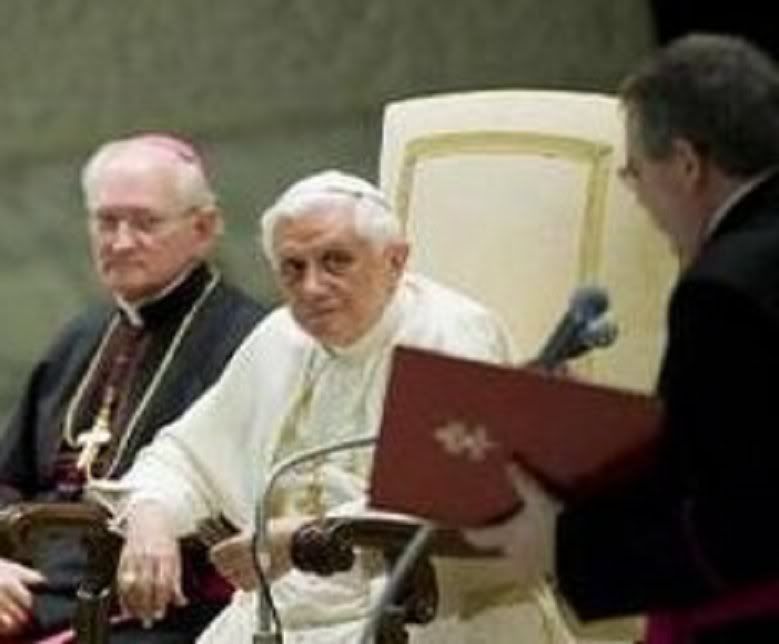
The Holy Father made this statement about the situation in India at the end of his multi-language greetings:
I have learned with deep sadness the news about the violence against the Christian communities in the Indian State of Orissa, which erupted following the deplorable murder of the Hindu leader Swami Lakshmananda Saraswati. Some persons have been killed and others injured. Worship centers, church property and private houses have also been destroyed.
While I firmly condemn all attacks against human life, the sacredness of which demands the respect of all, I express my spiritual closeness and solidarity to the brothers and sisters in the faith so hardly tried. I implore the Lord to accompany and support them in this time of suffering and give them the strength to continue in the service of love in favour of all.
I ask the religious leaders and civil authorities to work together to restore among the members of the various communities the peaceful coexistence and harmony which have always been the distinguishing mark of the Indian society.
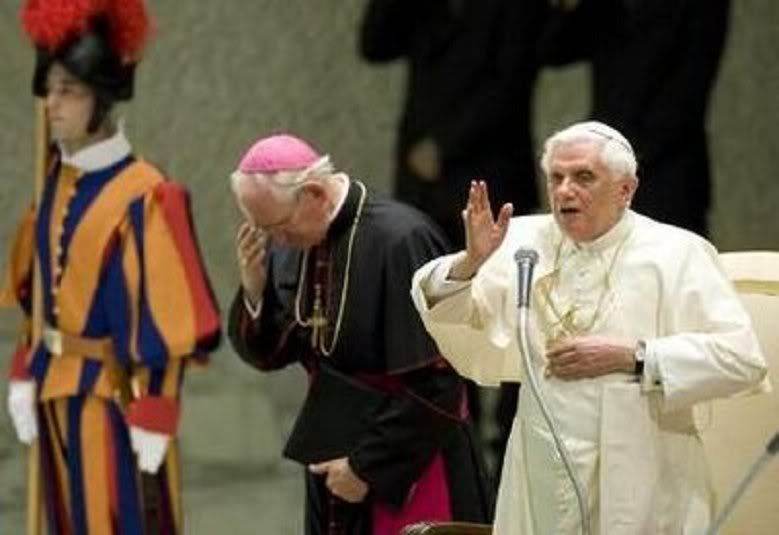 Here's the first wire-service report so far on the Pope's General Audience.
Pope condemns attack
Here's the first wire-service report so far on the Pope's General Audience.
Pope condemns attack
on Indian Christians
 
Rome, August 27 (dpa) - Pope Benedict XVI condemned on Wednesday deadly attacks on Christian churches in the eastern Indian state of Orissa during religious riots that have left almost a dozen dead since Monday.
"While I firmly condemn every attack on human life, whose sacredness requires respect by all, I express my spiritual closeness and solidarity to the brothers and sisters in the faith who are so sorely tried," Benedict said at his weekly audience.
Violence between Hindu and Christian communities was sparked on Monday by the death of a local Hindu leader. Activists of the right- wing Vishwa Hindu Parishad and its affiliate Bajrang Dal attacked churches, torched vehicles and stopped rail and road traffic in retaliation.
Pope Benedict also appealed to religious and community leaders to work together to ensure peaceful religious coexistence.
Here's an update on developments in India:
Indian police told
to shoot religious rioters
by Pratap Mohanty

BHUBANESWAR, India, August 27 (AFP) - Indian police were ordered to shoot on sight to end Hindu-Christian clashes on Wednesday as Pope Benedict XVI "firmly condemned" violence that has killed at least nine people.
Parts of eastern Orissa state have been rocked by Hindu-Christian clashes since Saturday, when a popular hardline Hindu religious leader and four of his disciples were shot dead by unknown assailants.
"We issued shoot-on-sight orders in the wake of large-scale violence" despite a curfew imposed Monday, said local administrator Satyabrata Sahu.
Mobs armed with sticks went on the rampage, torching government buildings and vehicles and staging other attacks, he said.
"This is unprecedented violence, much more widespread than we've ever seen" in the state, Father Babu Joseph, spokesman of the Catholic Bishops' Conference of India, told AFP.
Anti-riot forces had rushed to the area 300 kilometres (180 miles) southwest of state capital Bhubaneswar but were unable to reach many parts as protesters had "choked access roads with fallen trees," Sahu told AFP by telephone.
Pope Benedict XVI "firmly condemned" the violence in Orissa, where Australian missionary Graham Staines and his two young sons were burnt alive in 1999 -- a crime for which a Hindu man is serving life in jail.
The Pontiff said he "learnt with great sorrow" about "the violence against the Christian community in Orissa state which broke out after the reprehensible assassination" of the Hindu leader Swami Laxmanananda Saraswati.
"So far a total of nine persons have been killed in various incidents," Orissa Chief Minister Naveen Patnaik told the legislature, adding 54 people were arrested. But he insisted the situation was "under control."
Among those killed was a Hindu woman working at an orphanage who was burnt to death when the missionary-run facility was torched by a Hindu mob. Originally she was reported to be a nun.
Authorities have refused to reveal the religious identities of the other people killed in the clashes. But a senior police official, who wished to remain unnamed, said the dead included two Christians and two Hindus.
National junior home minister Sriprakash Jaiswal, visiting Bhubaneshwar, urged the state government to go on a "war footing" to contain the violence.
Hindu-Christian clashes erupt periodically in India where 2.3 percent of the population of more than 1.1 billion are Christians.
Hardline Hindus accuse missionaries of "bribing" poor tribals and low-caste Hindus, who often face strong discrimination, to convert by offering education and health care.
Police have blamed the death of Saraswati, who had campaigned against the so-called "forced conversions," on Maoist guerrillas. But hardline Hindus accused Christians of responsibility for his death.
"The Christian missionaries are responsible for the murder," fiery Hindu nationalist leader Praveen Togadia told AFP.
Authorities would not comment on allegations by an Indian bishops' group that dozens of churches had been burnt along with hundreds of houses belonging to Christians in Kandhamal and adjoining districts.
Christian groups say a lay missionary was burnt alive and that Catholic priests and other religious figures have been attacked.
Christian groups estimate at least half a million people following the faith live in Orissa. In Kandhamal, where the latest trouble flared, 20 percent of the population is believed to be Christian.
Last December, New-York based Human Rights Watch accused extremist Hindu groups in Orissa of conducting an anti-Christian campaign "while government officials have looked the other way."
The bishops' organisation has asked Catholic-run schools and colleges across India to close Friday to protest against the religious violence.
* * * * * * * * * * * * * * * * * * * * * * * * * * * * * * * * * * * * * * * * * * * * * * * * * * * * * * *
Pope blesses JP-II mosaic
created for Polish church
Translated from
the 8/28/08 issue of

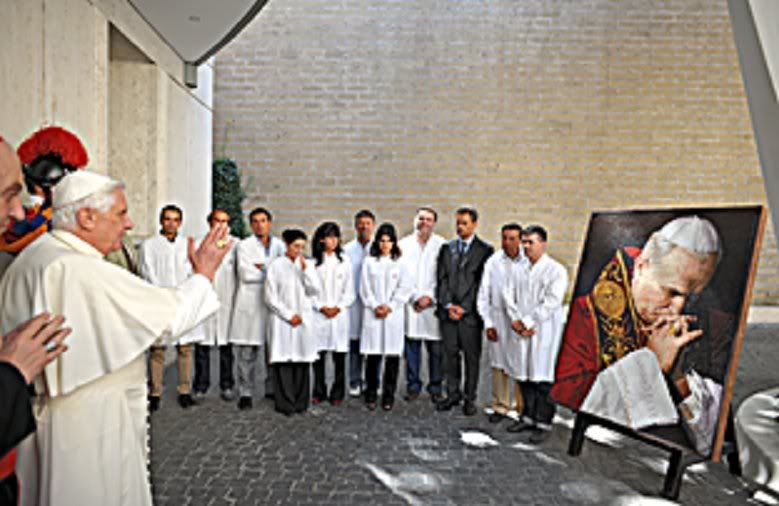
At the end of the General Audience today, Pope Benedict XVI proceeded to the Piazzale Giovanni Paolo II inside the Vatican to bless a mosaic
of his predecessor created by the mosaic studio of the Fabbrica di San Pietro at the request for the parish of St. Charles Borromeo in Niepolamice, Cracow.
The mosaic will adorn the facade of the parish church, where the late Pope used to spend time in prayer when he was Archbishop of Cracow.
Present at the blessing were Cardinal Angelo Comastri, head of the Fabrrica and Arch-Priest of St. Peter's, as well as the artists and artisans who created the mosaic.
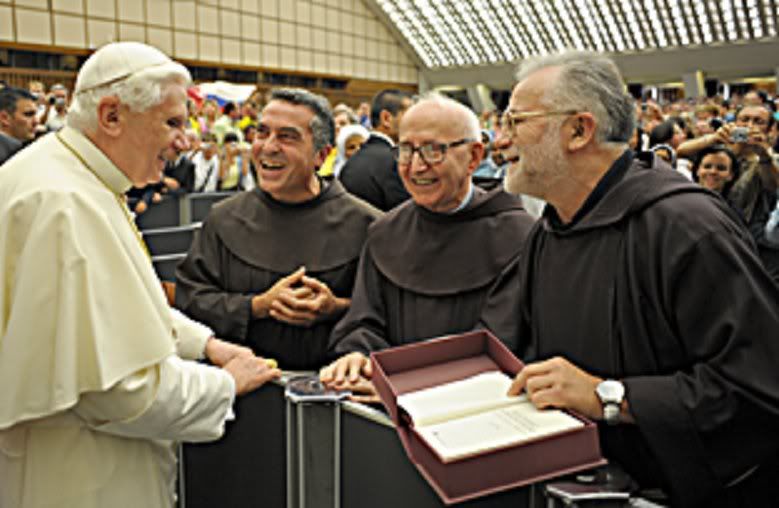
[Modificato da TERESA BENEDETTA 28/08/2008 01:51] |
 27/08/2008 14:55 27/08/2008 14:55 |
|
| | | OFFLINE | Post: 1.518 | Registrato il: 27/11/2005
| Utente Veteran | |
|
Janice - don't misunderstand me, I love EWTN and I know that Raymond Arroyo is right behind Benedict XVI one hundred per cent, BUT I, too, would have switched to another channel during the Pope's USA visit, had I had one. I am still puzzled by Father Neuhaus's attitude and I'm going to watch the DVD of 19th April again. Perhaps I got the wrong impression about Fr Neuhaus then and assumed he was backing Joseph Ratzinger, as Raymond clearly was.
And those people in France making snap judgements about our Papa when they probably know next to nothing about him, really annoy me too. It is exactly the same in my own parish in England. They haven't read his encyclicals or Summorum Pontificum or any of his homilies - they just think of him as the strict enforcer of the Faith. Well, let's face it, he still does have to enforce the Faith, but as "Shepherd" he can now do this in a kind and loving way. They forget his former job was just that, a job!!!!!! ![[SM=g27826]](https://im0.freeforumzone.it/up/0/26/10852140.gif) |
 27/08/2008 17:49 27/08/2008 17:49 |
|
| | | OFFLINE | | Post: 83 | Registrato il: 16/07/2007
| Utente Junior | |
|
Maryjos,
I don't doubt for a moment that Fr. Neuhaus backed Joseph Ratzinger in 2005, but not for the reasons everyone thought. I think Fr. Neuhaus assumed that, as Pope, Joseph Ratzinger would simply act as John Paul's surrogate, to put into action what John Paul had been unable to do. I don't believe that Fr. Neuhaus ever entertained the idea that Joseph Ratzinger would begin initiatives of his own or depart, in great measure, from some of John Paul's own programmes. And I don't believe that Fr. Neuhaus ever thought that Pope Benedict's own popularity would approach John Paul's. Of course, he can't discount the weekly attendance at the audiences and the figures in Australia (which was a very difficult place to get to, not to mention the costs involved), accompanied by the enthusiasm. I think Fr. Neuhaus feels betrayed, in a way, that John Paul has been eclipsed by someone that Fr. Neuhaus always figured was a good lieutenant, but not really an inspiring leader. Just goes to show: you never know. The conventional wisdom was no one could ever come close to John Paul - he set the standard for the foreseeable future. And then Benedict comes right out of the box and starts setting records for attendance. And the Romans LOVE him.
I have my own little prediction: Benedict will be the saint. |
 27/08/2008 20:06 27/08/2008 20:06 |
|
| | | OFFLINE | Post: 431 | Registrato il: 24/11/2005
| Utente Senior | |
|
Janice0Kraus, 8/27/2008 5:49 PM:
Maryjos,
I have my own little prediction: Benedict will be the saint.
I agree.
Thanks Teresa for the posts on the GA and the article from 30 DAYS. Its very interesting to read Card. Ratzinger's memories about Paul VI, John Paul I and the conclaves of 1978.
|
 27/08/2008 21:57 27/08/2008 21:57 |
|
| | | OFFLINE | | Post: 14.783 | Registrato il: 28/08/2005
| Utente Gold | |
|

The Vatican today released the official program of the Holy Father's visit to Cagliari in Sardinia on Sept. 7. It confirms the offiial program released by the Diocese of Cagliari earlier.
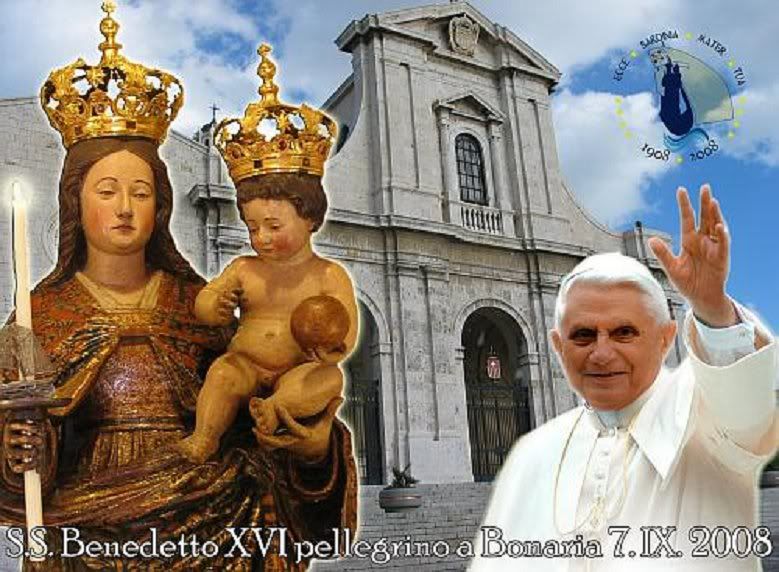
PASTORAL VISIT OF HIS HOLINESS BENEDICT XVI
CAGLIARI, SARDINIA - September 7, 2008
PROGRAM
ROME- CIAMPINO
08.30 Departure from Ciampino airport for Cagliari.
CAGLIARI
09.30 Arrival at Cagliari-Elmas airport.
10.00 Visit to the Shrine of Our Lady of Bonaria
10.30 EUCHARISTIC CELEBRATION in front of the Basilica of Bonaria
- Homily by teh Holy Father.
12.00 TNE ANGELUS
- Remarks by the Holy Father.
12.45 Visit to the Chapel of the Regional Seminary of Cagliari.
13.30 Lunch with the Bishops of Sardinia at the Seminary.
16.30 Greeting members of the Organizing Committee for the visit, at the Seminary.
17.00 MEETING WITH PRIESTS, SEMINARIANS AND THE THEOLOGICAL FACULTY OF SARDINIA,
at the Cathedral of Cagliari.
- Address by the Holy Father.
18.15 MEETING WITH THE YOUTH at Piazza Yenne.
- Address by the Holy Father.
19.30 Depart from Cagliari-Elmas airport for Rome-Ciampino.
ROME-CIAMPINO
20.30 Arrive at Ciampino airport.
|
 28/08/2008 04:39 28/08/2008 04:39 |
|
| | | OFFLINE | | Post: 14.785 | Registrato il: 28/08/2005
| Utente Gold | |
|
 Reflections on justice and human rights
Reflections on justice and human rights
in Pope Benedict XVI's address at the UN
by Mary Ann Glendon
Ambassador of the United States of America to the Holy See
Address at the XXIX Meeting at Rimini
on 'Friendship among Peoples'
August 26, 2008
 The annual Meeting in Rimini, northeast Italy, sponsored by Comunione e Liberazione for the past 29 years to promote Friendship among Peoples, is taking place this week from August 24-30. One of their roundtable discussions was devoted to discussing the Holy Father's speech to the United Nations last April.
The annual Meeting in Rimini, northeast Italy, sponsored by Comunione e Liberazione for the past 29 years to promote Friendship among Peoples, is taking place this week from August 24-30. One of their roundtable discussions was devoted to discussing the Holy Father's speech to the United Nations last April.
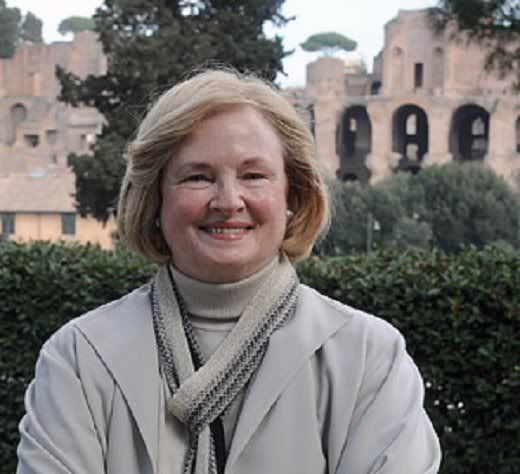
Ambassador Glendon.
We have been asked to discuss the themes of “Justice and Human Rights” in Pope Benedict XVI's April 18 address to the United Nations, and it is my pleasant task to begin by offering a few reflections about the Pope's treatment of those topics.
As it happens, I had the good fortune to be present at the UN when the Holy Father delivered that speech, and to witness the enthusiastic standing ovation that it received.
At the time, however, I could not help wondering whether those who applauded the Pope with such enthusiasm had really grasped the full implications of his words.
For, as with many of Pope Benedict's speeches, it is one where some rather complex ideas are expressed in a very condensed fashion. It is a speech that needs, as they say, to be “unpacked.”
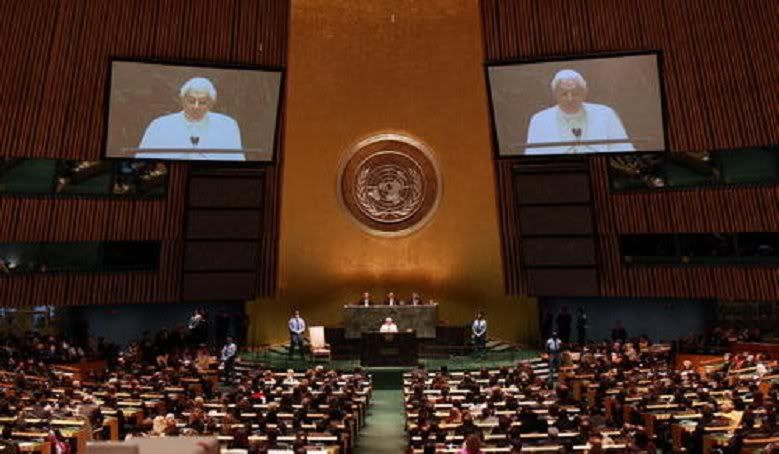
I would say, too, that it is a speech directed at a far wider audience than the assembled diplomats in the UN General Assembly. The messages delivered from that platform were certainly meant for all who wish, in the expression of Don Luigi Giussani, to be “protagonists” rather than “nobodies” in our increasingly interdependent, yet conflict ridden, world. Thus, it is especially appropriate that we are pondering those messages here at this Meeting.
Pope Benedict's approach to the modern international human rights project, like that of his predecessors, is one of support and encouragement. Back in 1948, the proponents of the Universal Declaration of Human Rights received considerable discreet assistance from Cardinal Roncalli, then the papal nuncio in Paris, later Blessed Pope John XXIII. And Pope John Paul II frequently praised the UDHR, referring to it as “one of the highest expressions of the human conscience of our time.”[1]
In fact it was during the pontificate of John Paul II that the international human rights movement – with the 1948 Declaration as its polestar – demonstrated its remarkable potential as a force for peaceful change, particularly in Eastern Europe and South Africa.
Yet, on the Declaration's 50th anniversary in 1998, he warned that “two shadows” were hovering over the event – in the form of attacks on “two essential characteristics of the very idea of human rights: their universality and their indivisibility”.[2] By then, those attacks had become especially virulent, as was evident at the Cairo and Beijing conferences.
Against that background, there was much curiosity about what Pope Benedict would say when he addressed the UN in the year of the Declaration's 60th anniversary.
Today, the UDHR has become the single universal secular standard for decent human behavior, and the language of rights has become the principal language for carrying on those discussions.
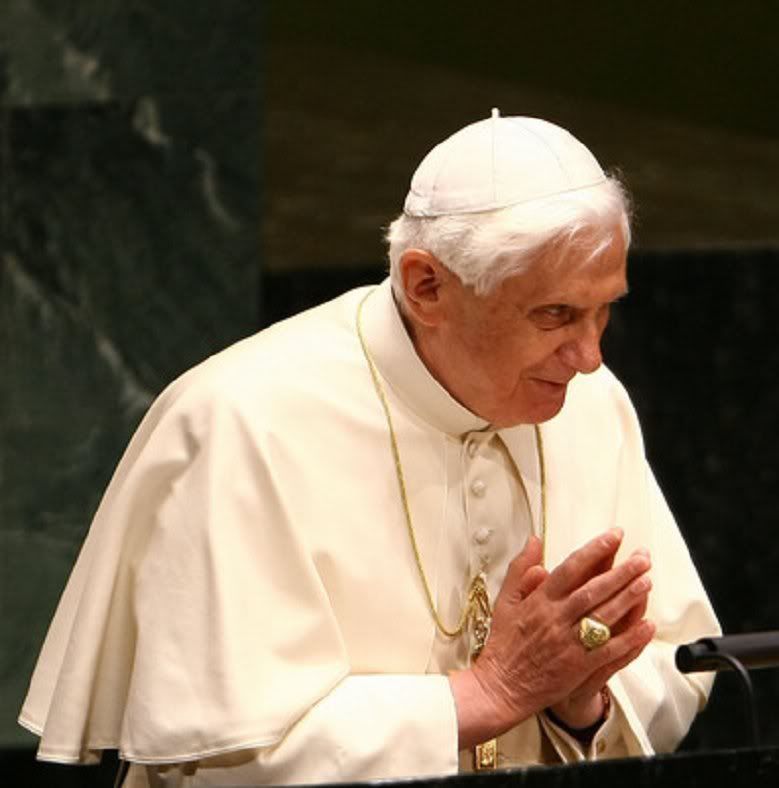
Pope Benedict took those facts as his starting point, noting that “Human rights are increasingly being presented as the common language and ethical substratum of international relations.”
But success has had its costs. For the more the international human rights idea has shown its power, the more intense has become the struggle to capture that power for various ends, not all of which are respectful of human dignity.
In 1948, many scoffed at the idea that mere words could make a truth - that a few courageous people willing to “call good and evil by name”- could change the course of history. That year, one of those people, Vaclav Havel, wrote, “I really do inhabit a world where words are capable of shaking the entire system of government, where words can be mightier than ten military divisions.”
But the artist in Havel was already worried about the power of words: “Words can be rays of light in a realm of darkness,” but they can also be “lethal arrows.” Sometimes, he mused, the same words that once were rays of light can become lethal arrows. And, sometimes our most noble human enterprises can take a wrong turn.
Who would have thought in those heady days that the human rights project would become so powerful that it risked being turned against itself, and against the human person? But that question comes to mind when one ponders Pope Benedict's pointed discussion of the challenges facing human rights at the present time.
The Pope began his discussion with praise for the UDHR, describing it as the outcome of a process designed “to place the human person at the heart of institutions, laws, and the working of society.” And he credited it with having enabled “different cultures, juridical expressions and institutional models to converge around a fundamental nucleus of values and hence of rights.”
But what is striking is that those expressions of appreciation are accompanied by a set of warnings that amount to what is perhaps the most sobering cautionary discussion about human rights that has ever appeared in any papal document.
Pope Benedict's short speech signals no fewer than nine dilemmas that have beset the human rights project from the beginning — nine dilemmas that, ironically, have become more acute as the human rights project has advanced:
(1) the threat posed by cultural relativism,
(2) the risks of positivism,
(3) the unsettled question of fundations,
(4) the temptation of utilitarianism,
(5) the spread of selective approaches to rights,
(6) escalating demands for new rights,
(7) hyper-individualistic interpretations of rights,
(8) forgetfulness of the relation between rights and responsibilities, and
(9) the threat to religious freedom posed by dogmatic secularism.
What makes these challenges especially poignant is that many of them have emerged from developments that nearly every friend of human rights would consider to have been genuine advances for humanity, while others contain elements of constructive criticism.
1. Consider, for example, the challenge of cultural relativism. In his UN speech, the Pope warned against the denial of universality “in the name of different cultural, political, social and even religious outlooks,” and criticized the use of “the argument of cultural specifity to mask violations of human rights.”
As we all know, some of the world's worst human rights violators, most recently Burma, have attempted to hide behind that argument.
At the same time, however, one must admit that it is not always easy to distinguish between the cultural relativism that undermines universality, and a legitimate pluralism that permits different means of expressing and protecting fundamental rights.
Universality need not entail homogeneity, and the existence of different ways of implementing principles does not necessarily entail relativism about the principles themselves[3].
In fact, the history of inculturation of the Christian faith in vastly diverse societies provides eloquent testimony that the common understanding of core truths can be enriched by the accumulation of a variety of experiences in living those truths.
Thus, the Pope's warning about cultural relativism should not be understood as putting universal rights and cultural particularities into stark opposition. After all, rights emerge from culture; rights cannot be sustained without cultural underpinnings; and rights, to be effective, must become part of each people's way of life.
In fact, to ignore that reality would be to run the opposite risk—that of cultural imperialism. It would be to fall into the mindset that characterizes the professional culture of many international lawyers, international civil servants, and international NGOs — a kind of international-ism that is insensitive to local particularities and that insists on its own dogmatic interpretations of human rights.
2. But how can one distinguish pure cultural relativism from legitimate pluralism? By what standard can a nation's conduct be judged if rights are viewed merely as the result of legislative enactments or other official decisions?
That question brings us to a second point in the Pope's speech — his critique of positivism. As the Pope put it, justice is often denied when rights are considered “purely in terms of legality ...divorced from the ethical and rational dimension which is their fundation and their goal.”
In that connection, the Pope has noted approvingly the position of the American founders that basic rights are pre-political. For example, Alexander Hamilton, in language highly compatible with that of Pope Benedict, once wrote, “The sacred rights of mankind are not to be rummaged for among old parchments....They are written...in the whole volume of human nature by the hand of divinity itself; and can never be erased or obscured by mortal power.”
Similarly, in Catholic thought, human rights arise from a natural order whose laws can be discovered through study and experience - by believer and unbeliever alike. To remove human rights from that context, the Pope points out, would destroy their universality.
As a lawyer, however, I must pause to note the obvious: that fair procedures and rules of law, while not sufficient in themselves, are extremely important to the protection of human freedom and dignity (and are recognized as such in the UDHR). Like the fundamental rights they protect, they, too, represent hard-won cultural achievements.
3. But all those achievements are fragile in our post-modern world. The fact that understandings of rights, justice, and natural law are hotly contested today brings the Pope to a third neuralgic point: foundations.
Philosophical relativism has penetrated so deeply into popular culture that good men and women are increasingly unable to say why any values should be defended or why any conduct should be condemned, except that it's a matter of preference.
But if there are no common truths to which people of different backgrounds and cultures can appeal, it is difficult to see how universal rights can be upheld.
That prompted the Polish poet Czeslaw Milosz to wonder about the fate of “those beautiful and moving words which pertain to the old repertory of the rights of man and the dignity of the person. I wonder at this phenomenon because maybe underneath there is an abyss. After all, these ideas had their foundation in religion....How will they stay afloat if the bottom is taken out?”
The answer of Pope Benedict, about which I will say more presently, is that these ideas can be defended on the basis of reason and experience. But, even so, the issue of “who decides” will always be a thorny one – one that the liberal democracies have found best to approach through separation of powers and checks-and-balances.
4. The problem of foundations has led many friends of human rights to defend them on the basis of what the Pope, in a fourth critical observation, calls a “utilitarian prospective.”
As a practical matter, considerations of utility have their place in many common situations. But “the greatest good for the greatest number” can spell doom for the weakest and most vulnerable members of society. Thus, utilitarianism can easily become a justification for the imposition of the will of the stronger.
5. A fifth element of the Pope's critique concerns selectivity, the widespread tendency to treat fundamental rights like items on a menu from which one can pick and choose one's favorites, ignoring the rest. Though the principle that univeral rights are “interdependent and indivisible” has been affirmed in many UN documents, it is conspicuously flouted in practice by nation states and interest groups alike.
For the past 60 years, however, one of the strongest voices in defense of the Universal Declaration as an integrated whole has been that of the Holy See. During the Cold War, it resisted the separation of political and civil rights from social and economic rights, while recognizing that the UDHR allows more diversity in modes of implementation of the latter than the former.
Today, with the provisions protecting marriage, the family, parental rights, and religious freedom under mounting assault, the Pope warned against pressures to “move away from the protection if human dignity towards the satisfaction of simple interests, often particular interests,” insisting that the Declaration “cannot be applied piecemeal, according to trends or selective choices.”
6. The problem of selectivity is closely related to a sixth source of concern mentioned by the Pope — the pressure to expand the category of rights that aro so fundamental as to be deemed univeral. That category cannot be closed, for, as he pointed out, “new situations arise as history proceeds.”
On the other hand, the more goods or desires that are recognized as univeral rights, the more risk there is of trivializing core human values.
The problem is another concomitant of success. Now that the UDHR has been accepted as a universal standard, interest groups of all sorts have intensified their efforts to have their agenda items recognized as universal rights.
No wonder that the Pope called (twice in his short speech!) for great “discernment” in dealing with demands for new rights. In that connection, his last three warnings can be viewed as aids to distinguishing proposals that represent healthy developments from those that are harmful to human dignity.
7. The Pope's caution against privileging an excessively individualistic approach to human rights contains a reminder of the social dimension of human personhood.
“Rights and the resulting duties,” he said, “flow naturally from human interaction....They are the fruit of a commonly held sense of justice built primarily upon solidarity among the members of society.”
In other words, some constraints on individual behavior are necessary if large numbers of people are to live together in freedom. Good questions to ask about any proposed new right, therefore, are: What goods does it protect? What are its implicit assumptions about the human person, and his or her relation to society?
Long ago, Tocqueville sounded an equally pointed warning about the dangers of hyper-individualism. New forms of despotism, he predicted, could emerge unrecognized in societies where citizens withdraw into themselves, “constantly glutting their souls with petty and banal pleasures.” Tyranny would then appear as a protective power “that likes to see citizens enjoy themselves, provided they think of nothing but themselves.”
8. Another useful question to ask about a proposed new right, therefore, is whether it recognizes corresponding responsabilities. As the Pope put it, “In the name of freedom, there has to be a correlation between rights and duties, by which every person is called to assume responsability for his or her choices, made ad a consequence of entering into relations with others.”
9. Finally, let us note the Pope's allusion to one of his major preoccupations — the threat to religious freedom and human dignity posed by a dogmatic form of secularism that aims to displace religion from public life.
Though his allusion is brief, it is sufficient to evoke the recollection of extensive discussions elsewhere - by Pope Benedict, Marcello Pera, and Joseph Weiler, among others - of the dangers of ignoring the Biblical roots of the great achievements of modernity.
After this long litany of cautions about the human rights project, one might well wonder whether anything is left of Pope Benedict's affirmations! The outlines of a positive answer can be found, I believe, elsewhere in his writings.
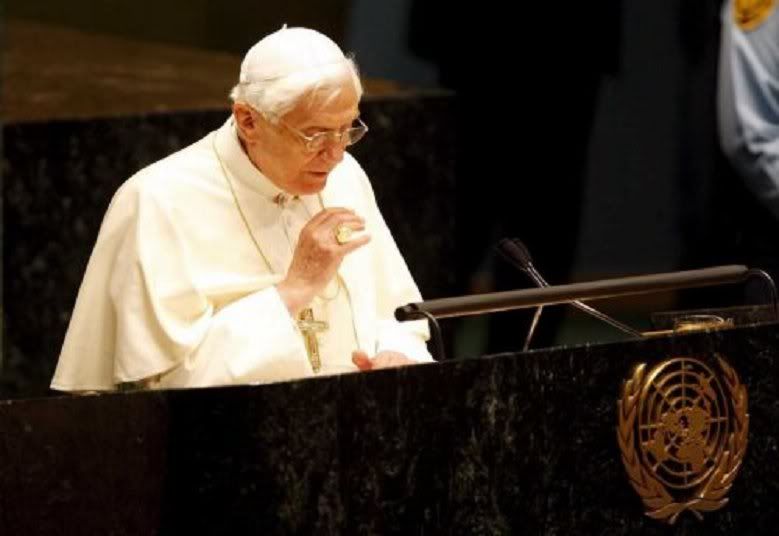
For example, in the lecture that he was to have given at La Sapienza University this past spring, he addressed a challenge to the Faculty of Jurisprudence. “How can juridical norms can be found that guarantee freedom, human dignity and human rights?”
Anticipating the standard response referring to democratic processes of deliberation, he observed that public argumentation in contemporary democracies aims above all at attaining majorities, and that “sensitivity to the truth is constantly overruled by sensitivity to interests,” often by “special interests that do not truly serve everyone.”
Having uttered the word “truth,” he was, of course, faced with Pilate's question: What is truth? The post-modern Pope said he could not “properly offer an answer, but only an invitation.”
The search for truth, he said, is “one that always demands strenuous new efforts, and that is never posed and resolved definitively.” The invitation he offered was “to remain on the journey with the great ones who throughout history have struggled and sought with their responses and their restlessness for the truth which continually beckons from beyond any individual answer.”
To a 17-year-old boy who, on another occasion, pressed the Pope to say more, the Pope replied: “There are only two options. Either one recognizes the priority of reason, of creative Reason that is at the beginning of all things and is the principle of all things...or the priority of the irrational,” which would mean accepting that everything on earth and in our lives, including reason itself, in only accidental. “The great option of Christianity,” he said, “is the option for rationality and the priority of reason.”
There is much more to be said on that subject — far more than I as a mere jurist — am qualified to discuss. But the application to the dilemmas that face the human rights project seems to be something like this: The self-subverting tendencies of freedom that we are now experiencing are not the whole story.
The quest for freedom that brought traditional authorities and institutions into question at the dawn of modernity, the struggle for freedom that has liberated countless human beings from dehumanizing conditions, the desire for freedom that now threatens to destroy freedom's foundations - that same freedom also gives us the opportunity for reconsideration in the light of reason and experience. That same freedom permits us to stand back, take a fresh look, to correct our course.
Let me conclude, therefore, by returning to the suggestion I made at the outset of these remarks – that the principal addressees of the Pope's remarks on human rights are not diplomats or UN officials.
He was also sending a message, an invitation, and a challenge to all men and women of good will. His words were meant to inspire each of us to consider the ways in which our decisions and actions in the areas where we live and work can help to shift probabilities either for or against a social order respectful of the dignity and rights of the person.
“Every generation,” as he wrote in Spe Salvi, “has the task of engaging anew in the arduous search for the right way to order human affairs”.[4] No one doubts that the stakes are high. The key decision for each of us, as Don Giussani taught, is whether to embrace that task and accept its challenges.
[1] UN 1995
[2] WDP 1998, 2
[3] WDP 1999, 3
[4] SS 25
* * * * * * * * * * * * * * * * * * * * * * * * * * * * * * * * * * * * * * * * * * * * * * * * * * * * * * *
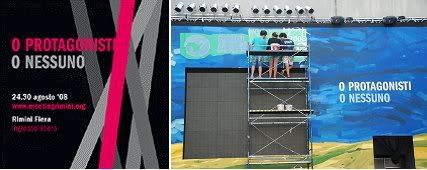
The 29th annual Meeting at Rimini has for its theme 'O Protagonista o Nessuno' [You can be a player or nobody] - referring to the role Christians must play in society.
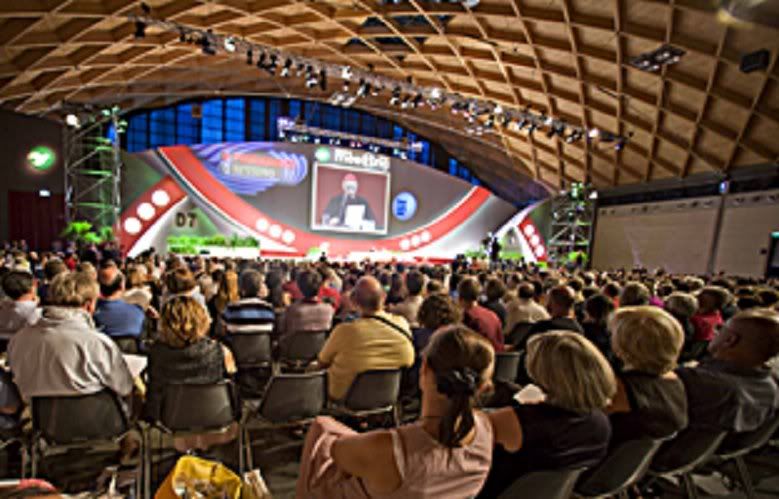
Pope Benedict sent a beautiful message to the opening last Sunday, which was read by the Bishop of Rimini to the assembly. A full translation has been posted in HOMILIES, DISCOURSES, MESSAGES.
Cardinal Bagnasco gave a powerful keynote address and Cardinal Tauran addressed the meeting earlier today. I will post what I can translate of the more interesting discussions this year.
[Modificato da TERESA BENEDETTA 28/08/2008 16:11] |
 28/08/2008 15:10 28/08/2008 15:10 |
|
| | | OFFLINE | | Post: 14.788 | Registrato il: 28/08/2005
| Utente Gold | |
|

The Vatican Press Office has not posted any bulletins for today as yet. Presumably, the Holy Father has no scheduled events today, and there are no announcements.
OR today.
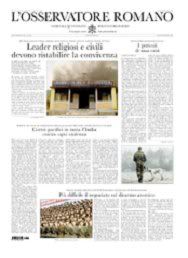 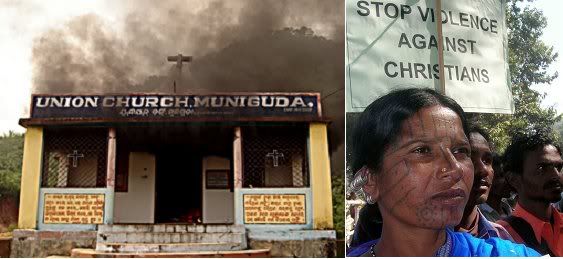 The main story is the Holy Father's appeal at the General Audience yesterday regarding anti-Christian violence in India:
'Religious and civil leaders should re-establish co-existence'
His catechesis on St. Paul is carried in an inside page.
The main story is the Holy Father's appeal at the General Audience yesterday regarding anti-Christian violence in India:
'Religious and civil leaders should re-establish co-existence'
His catechesis on St. Paul is carried in an inside page.
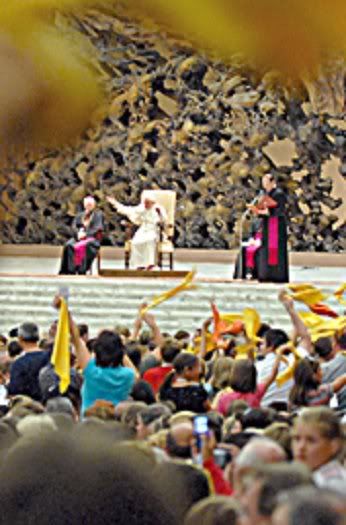 Other Page 1 stories: Catholic bishops will close down Catholic schools tomorrow, August 29, as a protest against the violence, and they are organizing peaceful protests all over India against all forms of violence. An editorial points out the international dangers in the ongoing crisis in the Caucasus between Russia and Georgia; and a story on North Korea's off-again nuclear disarmament program.
Ratzinger Schulerkreis seminar
Other Page 1 stories: Catholic bishops will close down Catholic schools tomorrow, August 29, as a protest against the violence, and they are organizing peaceful protests all over India against all forms of violence. An editorial points out the international dangers in the ongoing crisis in the Caucasus between Russia and Georgia; and a story on North Korea's off-again nuclear disarmament program.
Ratzinger Schulerkreis seminar
starts tomorrow in Castel Gandolfo
Translated from
 On his blog today, Andrea Tornielli reminds us
On his blog today, Andrea Tornielli reminds us:
The annual seminar-reunion of Professor Joseph Ratzinger's Schulerkreis starts tomorrow at Castel Gandolfo through Sunday.
It is precisely 'Ratzinger professore' who is the subject of the new book by 30 Giorni writer Gianni Valente, which I reviewed Monday for Il Giornale [a translation was posted on this thread], and which is reviewed today in Avvenire and Corriere della Sera.
And I bring you this bit of news: the Schulerkreis discussions this year will not focus on Martin Luther and the Reformation, as previously speculated, but rather Benedict XVI's JESUS OF NAZARETH and the historicity of the Gospels. The change was decided on in recent weeks.
NB: Two Luther scholars invited to address the seminar will be there, nevertheless.
[Modificato da TERESA BENEDETTA 28/08/2008 16:32] |
 28/08/2008 16:03 28/08/2008 16:03 |
|
| | | OFFLINE | | Post: 14.789 | Registrato il: 28/08/2005
| Utente Gold | |
|
 The Pope's challenge
The Pope's challenge
to the Rimini Meeting
by Giovanni Maria Vian
Editor, L'Osservatore Romano
Translated from

The letter which the Cardinal Secretary of State sent to the Bishop of Rimini, as head of the diocese where the annual Meeting for Friendship Among Peoples has been held for going on three decades, carries a very significant message.
It is not a mere ceremonial statement, because it enters fully into a question which is very close to the heart of Benedict XVI - and this is clear from the contents and tone of the letter sent by Bertone in the name of the Pope.
At the same time, it is in the tradition of the Rimini Meeting to confront issues that concern not only Comunione e Liberazione [promoters and organizers of the Meetings], but the Church, as well as the men and women of our time.
I think that was one of the intentions of Don Giussani [late founder fo C&L], which explains his enormous following as an educator and an inspiration for young people.
Will we be successful? Will we leave a mark behind us? These questions usually concern man. What do we leave behind us? More importantly, how can we be happy? Because what man seeks is happiness, as Greek philosophers noted 2500 years ago, long before Christianity. But, as Benedict XVI writes in his first encyclical, happiness is not an ideology, nor a morality, but a person.
Also very significant, I felt, was the ample reference to St. Paul in the Pope's message, precisely during this Jubilee Year dedicated to him. Paul was a historical figure who, like Christ himself, was an apparent failure in life.
The passage cited from the Second Letter to the Corinthians - one of the most authentic of Paul's letters - is an autobiographical description which describes all the torments and trials he had undergone.
And yet, Paul was fundamental in introducing the Christian revolution to the world. Without Paul, Christianity probably would not be what it is today.
To the eyes of the world, Paul would be a 'nobody', whereas in fact, he is a 'protagonist', a leading player, because he gave himself totally for Christ. After having been a dogged persecutor of Jesus's followers, he encountered Jesus in that mysterious and dazzling episode on the road to Damascus which changed his life.
From that time on, he literally spent himself to announce Christ and his Gospel to the known world of his time - proclamation and preaching which represent a total continuity with the historical Jesus, from whom Paul is inseparable, not a counter-figure as many scholars try to show, in the same way they have tried to separate the historical Jesus from the Jesus of the faith.
Finally, the letter speaks of 'humble protagonism'. An interesting oxymoron: to be somebody, but through humble service. This comes directly from an experience: "Come and see" was Jesus's invitation to his disciples in the Gospel of John.
Experience tells us that one becomes 'somebody' when one serves. And that is the mission that the Pope entrusts to Comunione e Liberazione: to be in the service of the Church.
The theme of the 2008 Meeting in Rimini - 'O Protagonisti o Nessuno' - translates in context as "Either be leading players or nobody", which refers to both the Church and individual Catholics, and how they can and should take part in responding to the social issues that concern every man and all men, on the individual level as on the social level.
I am re-posting here a translation of the Pope's message that I posted earlier in the week in HOMILIES, DISCOURSES, MESSAGES - a very beautiful meditation that was hardly given any attention, even in the Italian media.
MESSAGE TO THE 29TH ANNUAL MEETING
FOR FRIENDSHIP AMONG PEOPLES
(Rimini, Italy, August 24-30, 2008)
On the occasion of the 29th annual Meeting for Friendship among Peoples held in Rimini, on the theme 'O Protagonisti o Nessuno' - 'Either a Protagonist or No One' - Cardinal Tarcisio Bertone sent a message to the organizers and participants in the name of the Holy Father Benedict XVI. The message was read at the start of the Opening Day Mass on Sunday by Mons. Francesco Lambiasi, Bishop of Rimini. Here is a translation of the message:
To His Excellency
Mons. Francesco Lambiasi
Bishop of Rimini
Most Reverend Excellency,
On the occasion of the 29th edition of the Meeting for Friendship among Peoples taking place in Rimini from August 24-30, I am happy to convey to you, to the promoters and to all participants in this significant manifestation the heartfelt greetings of His Holiness Benedict XVI.
The provocative title of the encounter "O protagonisti o nessuno' is an immediate attention-getter. Actually, this is the precise intention of the organizers: to urge reflection on the concept of the person.
What does it mean to be a protagonist in one's own existence and that of the world? The question is urgent today because the alternative to playing an active role often appears to be a life without sense, the grey anonymity of so many 'nobodies' who are all confused among the folds and creases of an amorphous mass, and incapable, unfortunately, of emerging with their own face and being worthy of notice.
The question then must be placed in better focus and could be reformulated thus: what gives a man a face, what makes him unmistakably himself, what assures full dignity to his existence?
The society and culture in which we are immersed, and for which the mass media constitute a powerful echo chamber, are largely dominated by convictions that notoriety/fame constitutes an essential component of one's personal realization.
To emerge from anonymity, to succeed in imposing oneself in the public eye through any means and pretext - this is the goal pursued by many. Political and economic power, prestige in one's profession, wealth that can be displayed grandly, the notoriety of one's own self-realizations, ostentation even of one's excesses - all these are considered complacently as 'success' in life.
That is why, very often, the new generations aspire to professions and careers that they idealize precisely because they offer a spotlight that would allow them to 'shine', to feel they are 'somebody'. The ideal they aim for is represented by movie stars, personalities in show business and television, athletes, foot ball players, etc.
But what about those who will never reach such a level of social visibility? What about those who are forgotten, if not downright crushed, by the dynamics of worldly success to which is oriented the society in which we live?
What about those who are poor, powerless, sick, aged or disabled, those who have no talent to make their way ahead among others or have no means to cultivate any talents, those who do not have the voice to make their ideas and beliefs felt?
How do we consider those who lead obscure lives with no apparent relevance or interest for the mass media?
Man today, like man at all times, is driven to find happiness and will pursue it wherever he thinks he may find it. Here then is the true question hidden by the word 'protagonism' [playing an active role] that the Meeting offers for our reflection this year. What does happiness consist of? What can really lead man to achieve it?
Pope Benedict VI has designated this year as a special jubilee year dedicated to a champion of Christianity for all time, the Pharisee from Tarsus called Saul, who,after having persecuted the early church with fury, converted upon receiving the call of the Lord.
From that moment on, he served the cause of the Gospel with total dedication, tirelessly going to all the parts of the known world in his time and contributing to set the bases for that which would become European culture informed by Christianity.
Rare are the spirits who have shown a vastness of knowledge and acumen equal to his. His letters demonstrate the explosive power of his passionate personality and have attracted millions of readers, exercising a unique influence on generation after generation of men, on entire peoples and on nations.
Through his writings, Paul never ceased to present Christ as the authentic source of respect among men, peace among nations, adn justice with coexistence.
All of us, two thousand years removed, can still consider ourselves the 'children' of his preaching, and our civilization knows what it owes this man precisely for the values that have formed its foundation.
And yet St. Paul's existence was far from the glare of the spotlight and of public recognition. When he died, the Church that he had contributed to spread was still a small seed, a grouping that the highest authorities of the Roman Empire could either choose to ignore or to try to crush in blood.
The existence of Paul, examined in its daily particulars, was full of tribulations, afflicted by hostility and dangers, much more full of difficulties to face rather than comforts and joys. He himself gives vivid testimony of these in many passages of his writings.
Her is what he says, for instance, in the Second Letter to the Corinthians: "Five times at the hands of the Jews I received forty lashes minus one. Three times I was beaten with rods, once I was stoned, three times I was shipwrecked, I passed a night and a day on the deep; on frequent journeys, in dangers from rivers, dangers from robbers, dangers from my own race, dangers from Gentiles, dangers in the city, dangers in the wilderness, dangers at sea, dangers among false brothers; in toil and hardship, through many sleepless nights, through hunger and thirst, through frequent fastings, through cold and exposure. And apart from these things, there is the daily pressure upon me of my anxiety for all the churches. Who is weak, and I am not weak? Who is led to sin, and I am not indignant?" (11, 24-29).
This obstacle course - as we might define it - which he overcame with the strength and in the name of his Redeemer, Paul concluded in Rome, where after being condemned to death, he was beheaded. Together with him, in the fury of the persecutions by the Emperor Nero, many other Christians died, among them Peter, the fisherman from Galilee and head of the Church.
Can we consider Paul's life a 'success'? Here we face the paradox of Christian life as such. What, in fact, does it mean for a Christian to 'succeed'?
What do the lives of saints tell us who have spent their lives hidden in convents? What are we told by the lives and deaths of countless Christian martyrs, most of them unknown, who ended their existence not amid acclamation but surrounded by scorn, hatred or indifference?
Where are we to find the 'greatness' in such lives, the luminosity of their testimony, their 'success'?
Even recently, the Holy Father Benedict XVI recalled that man is made for the eternal fulfillment of his existence. This goes way beyond worldly success and is not in contradiction to however humble the conditions in which his earthly pilgrimage may take place.
Man's fulfillment is knowing God, by whom every person was created and to whom every fiber of our being reaches out. To do this, neither fame nor success before the crowds do not serve.
This then is the protagonism that the title of this edition of the Rimini Meeting aims to examine. Man is the protagonist of his own existence when he gives his life to God, who calls him to cooperate in the universal plan of salvation.
The Meeting wishes to reiterate that only Christ can disclose to man his true dignity and convey to him the authentic sense of his existence. When the believer follows him obediently, he is capable of leaving behind a lasting trace in history. It is the trace of love, of which he becomes a witness because he himself has been gripped by love.
Then, that which was possible for St. Paul also becomes possible for each of us. It doesn't matter if God's plan sees for us a small radius of action. It doesn't matter if we live behind the walls of a cloistered monastery or if we are immersed in multiple and diverse activities in the world. It doesn't matter if we are fathers and mothers, priests or consecrated persons.
God makes use of us according to his plan of love, according to ways that he decides, and he asks us to fall in with the action of his Spirit - he needs collaborators to realize his Kingdom. To each one he says, "Come follow me" (Lk 18,22), and only by following him can man know the true exaltation of his ego.
This is what we are taught by the experience of the saints, men and women who very often have lived their faithfulness to God in discreet and ordinary ways. Among them we find many true leading players in history, persons who were fully realized, living examples of hope, and witnesses to a love which fears nothing, not even death.
The Holy Father hopes that these reflections may help the participants of the Meeting to encounter Christ, to better understand the value of Christian life and to realize its sense in humble protagonism in the service of mission for the Church, in Italy and around the world.
To this end, he assures you of his prayers for the success of this Meeting and send to you, to the organizers and all present today, a special Benediction.
I gladly extend my most fervent wishes for the profitable success of this demonstration, and will avail of the occasion to affirm my respects in the name of the Lord.
Cardinal Tarcisio Bertone
Vatican Secretary of State
[Modificato da TERESA BENEDETTA 28/08/2008 16:48] |
|
|
|
|